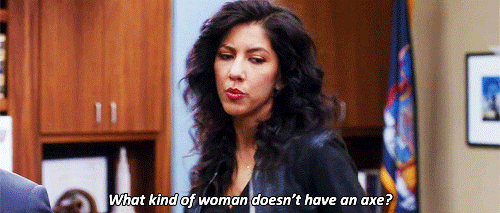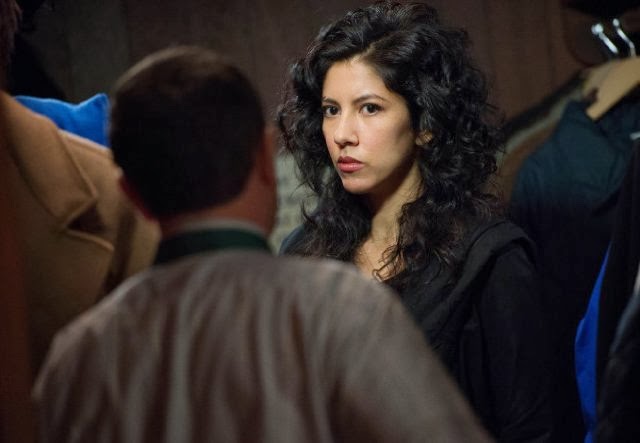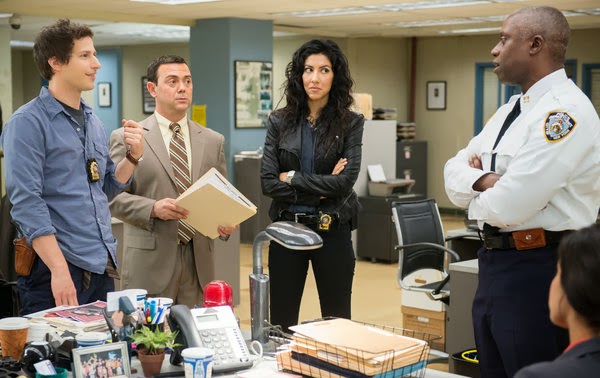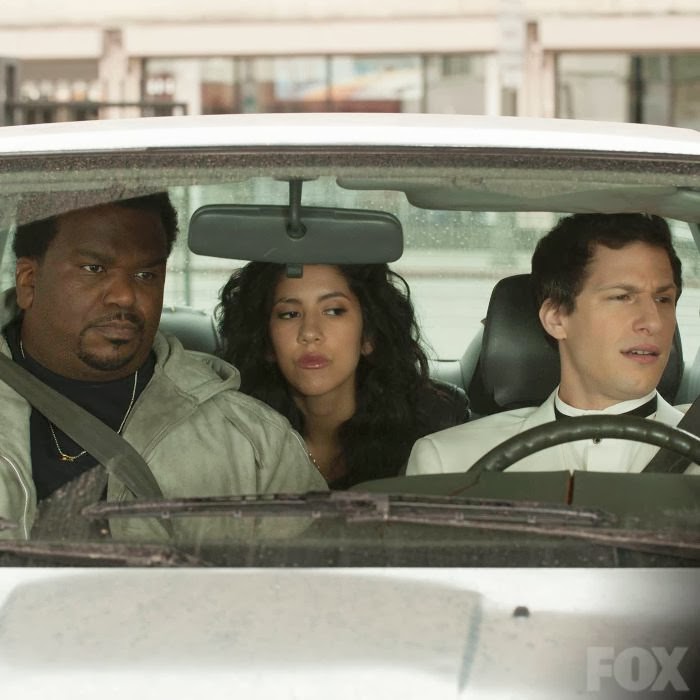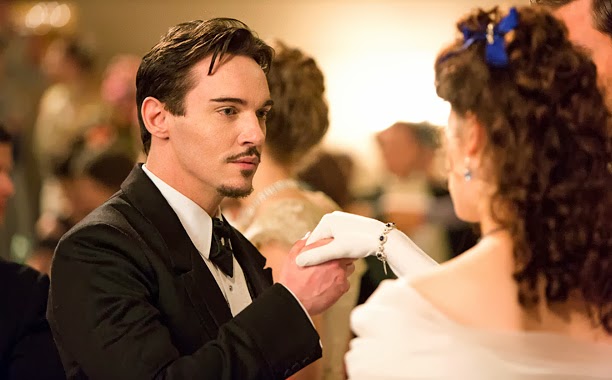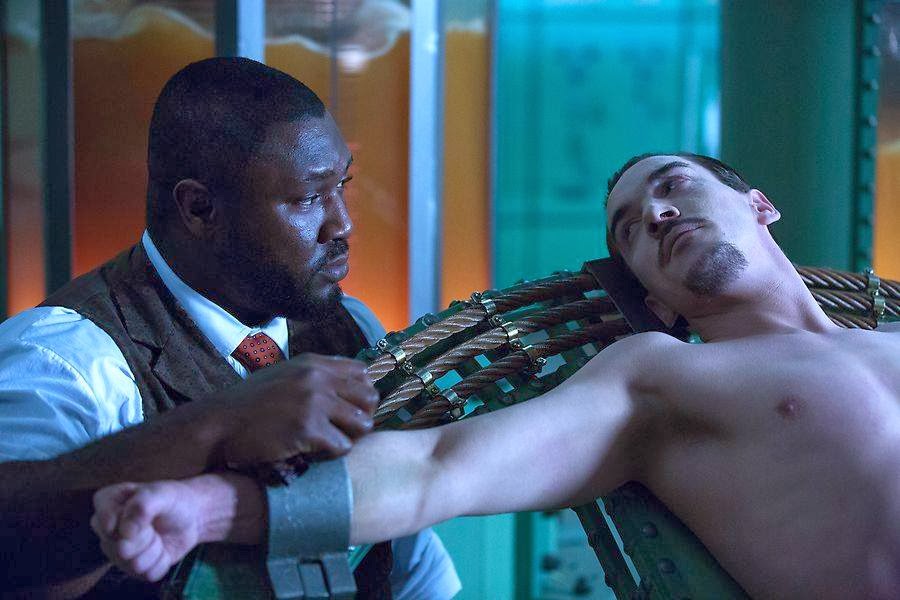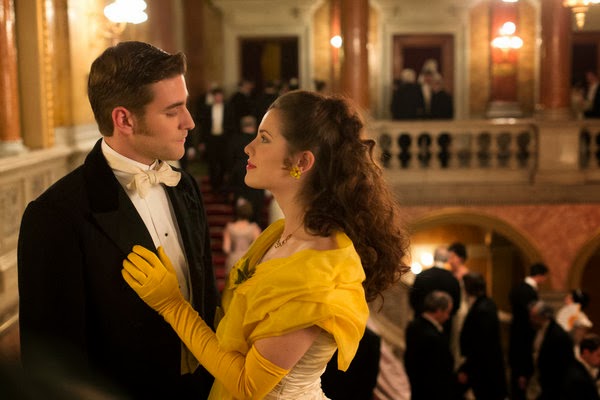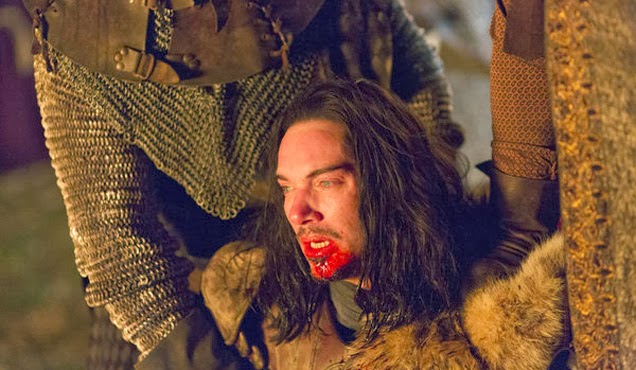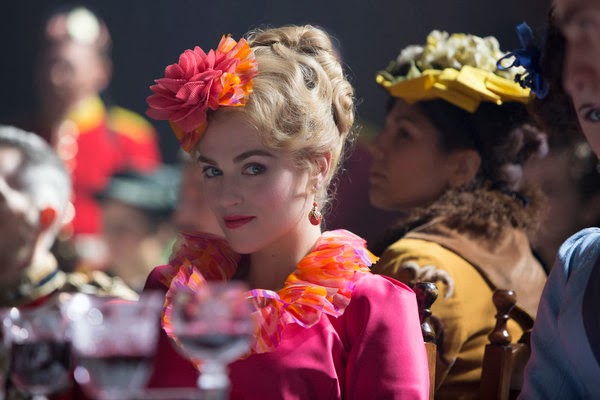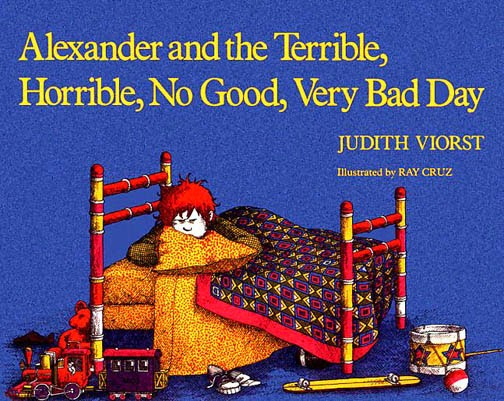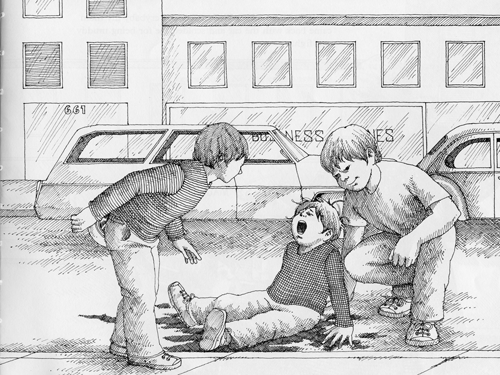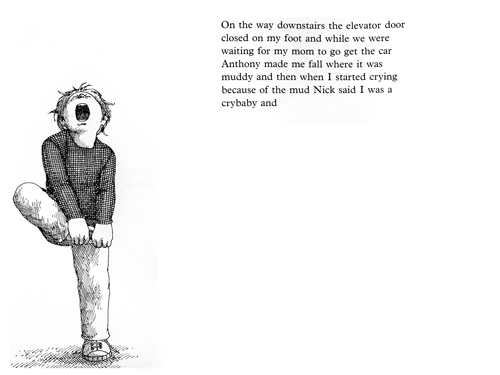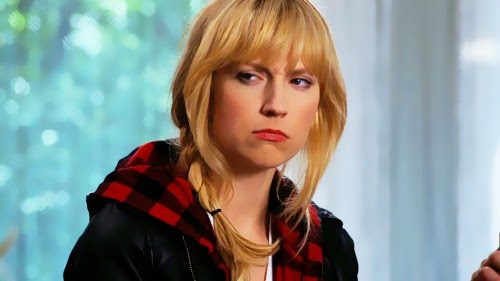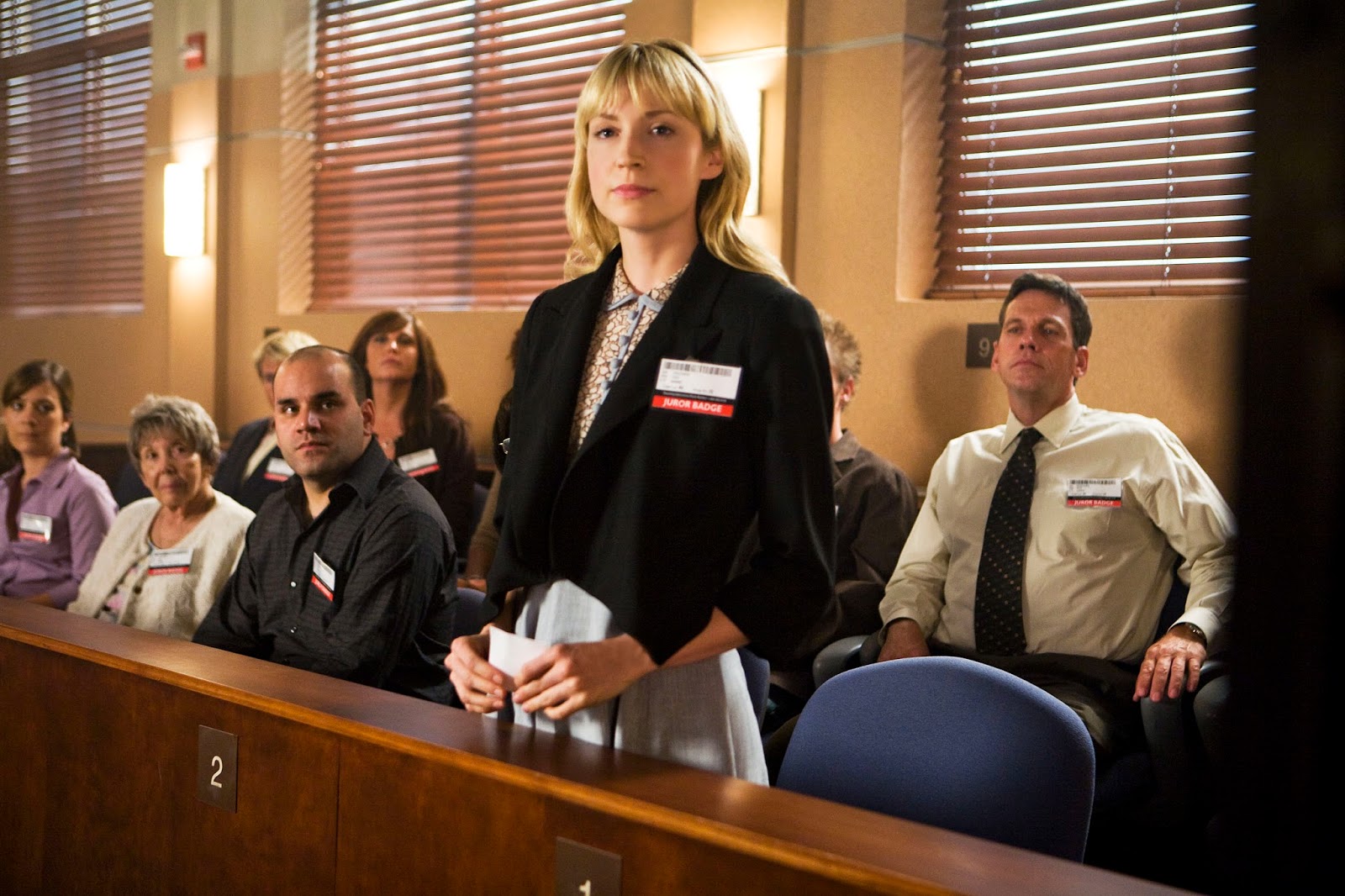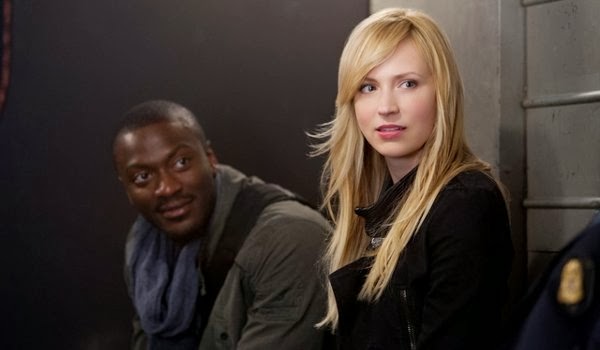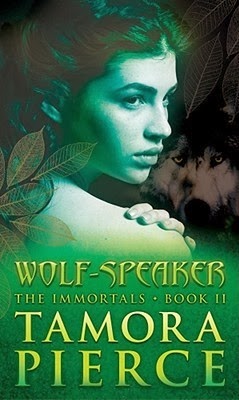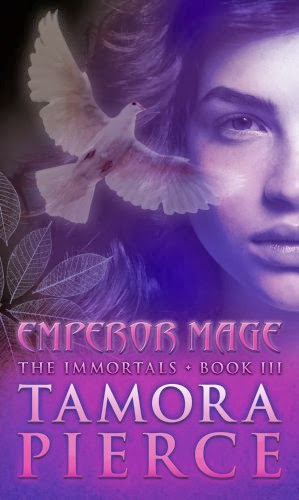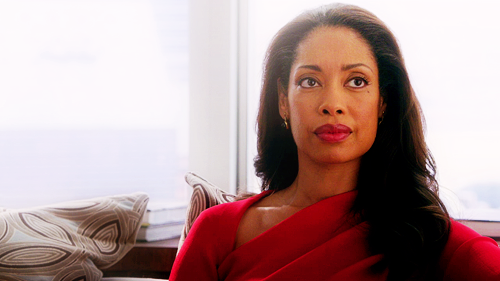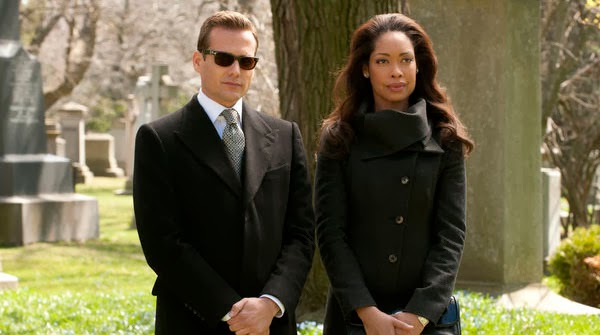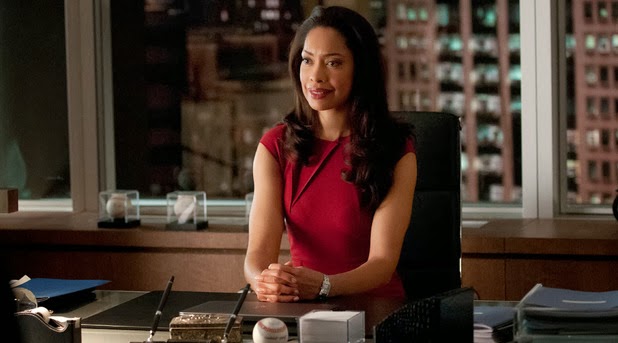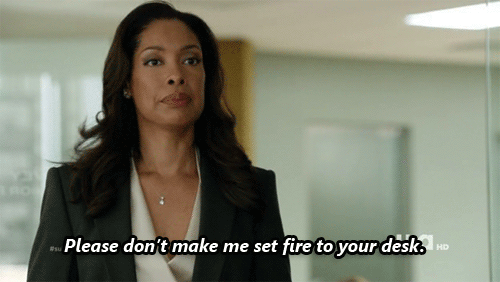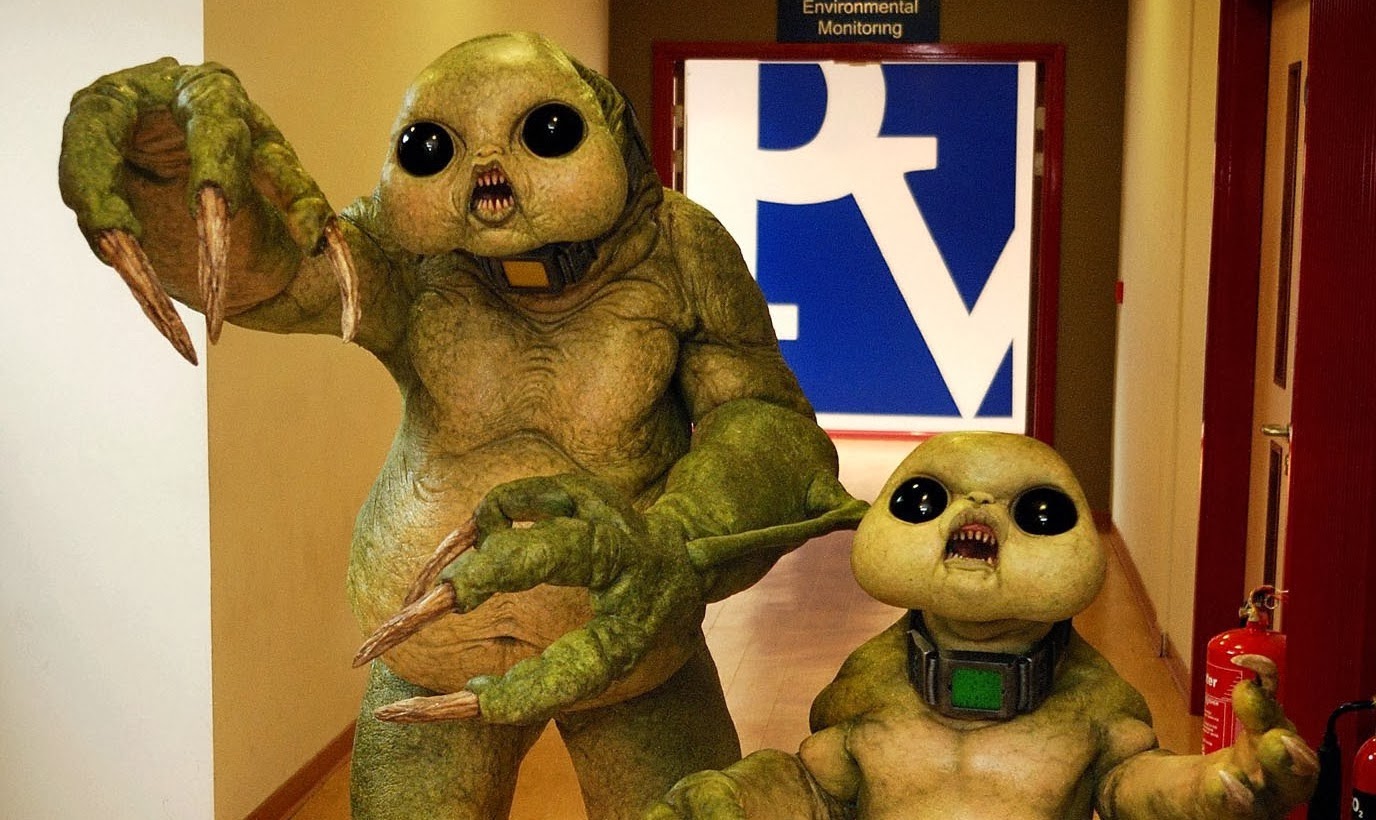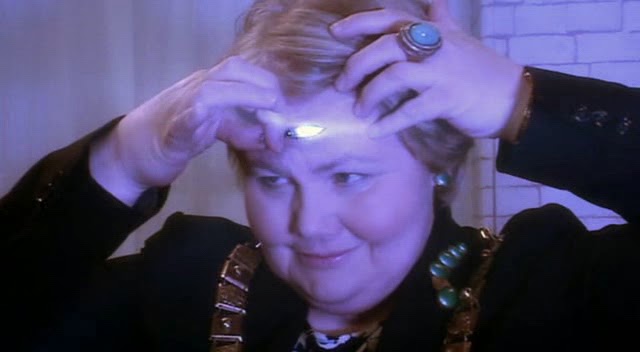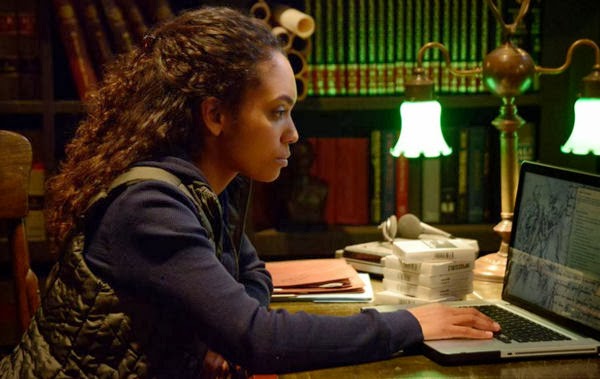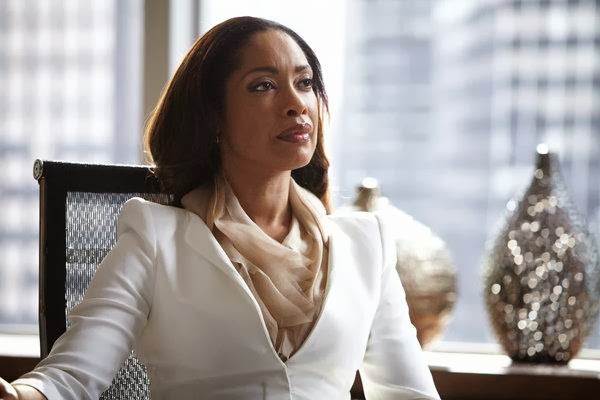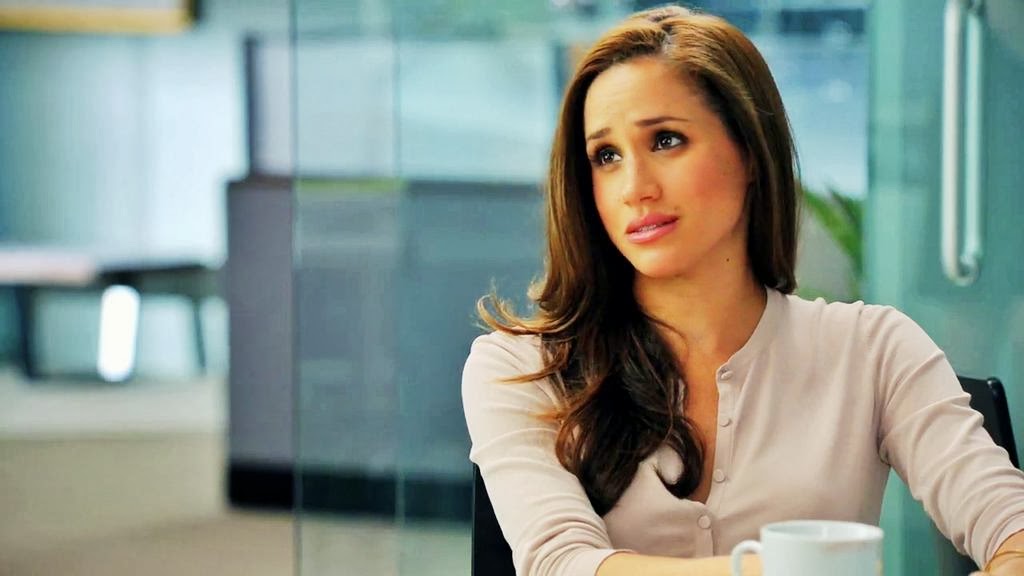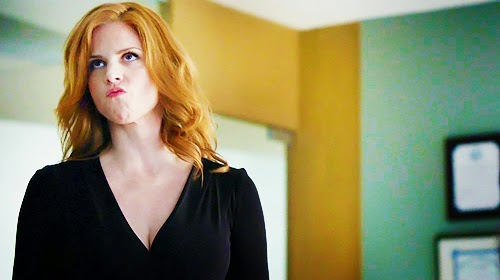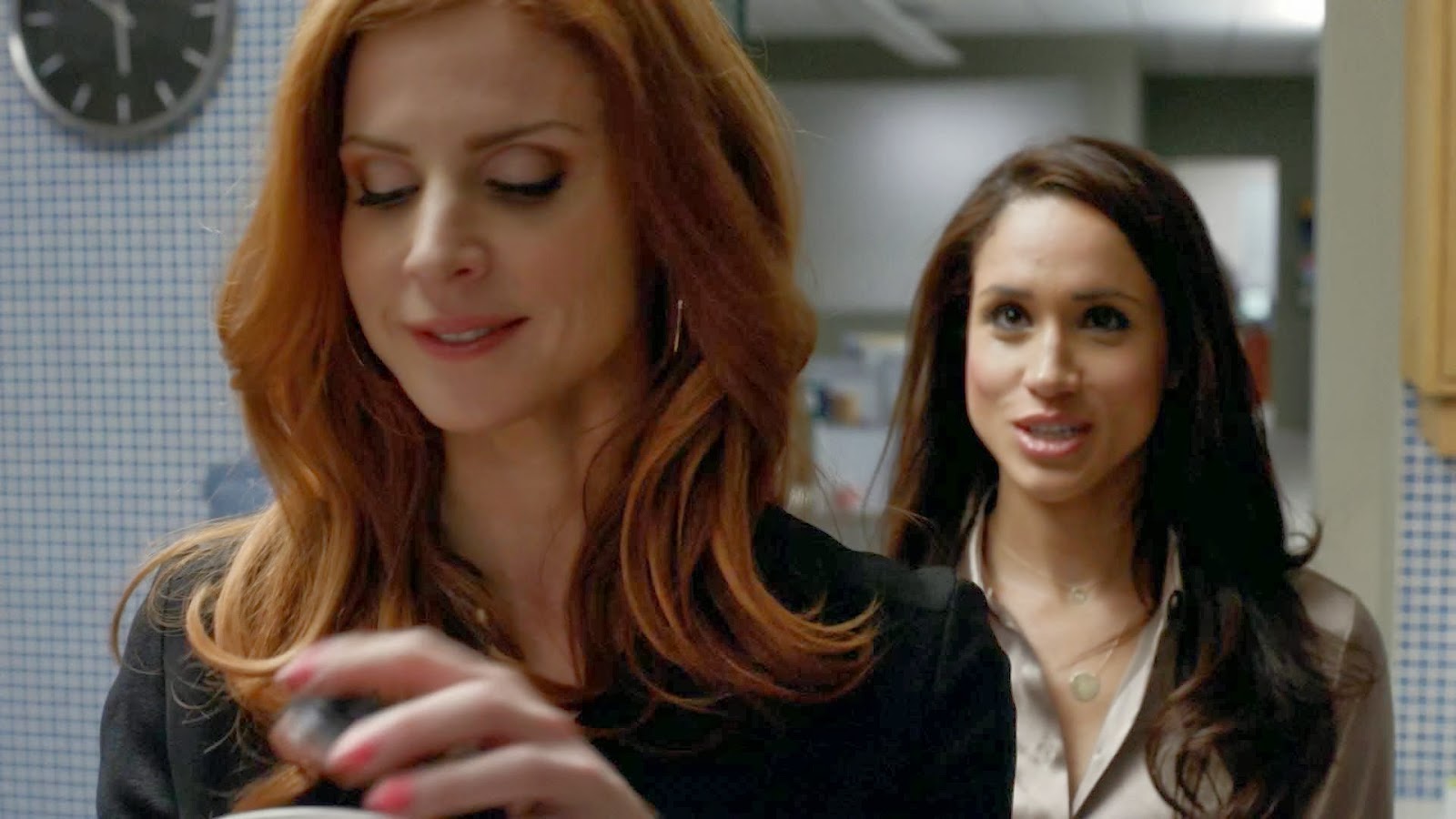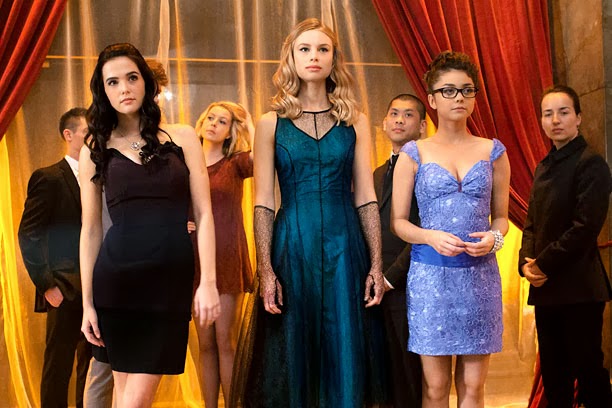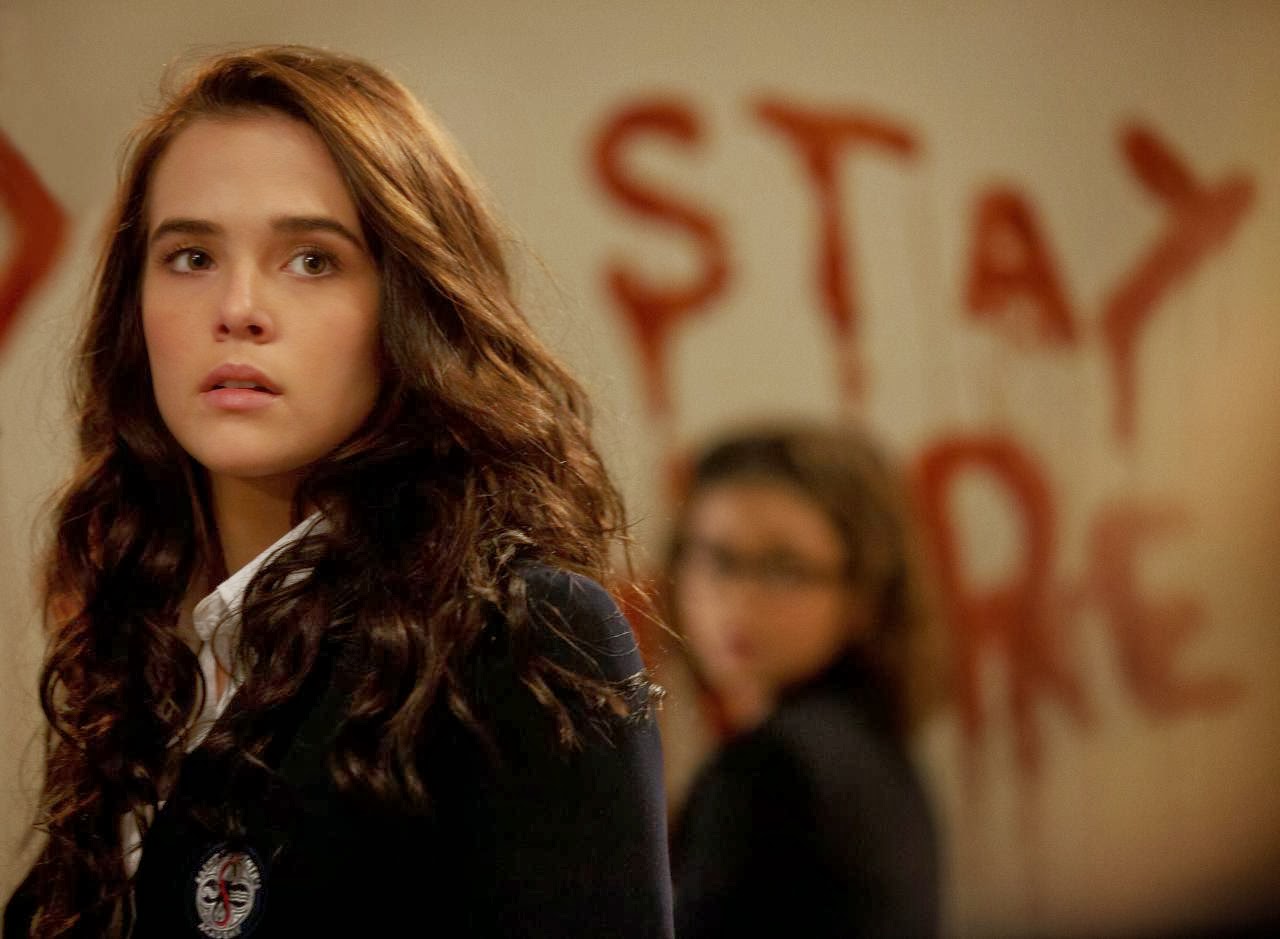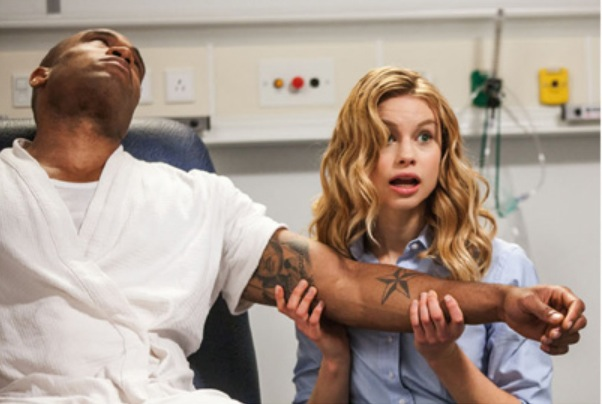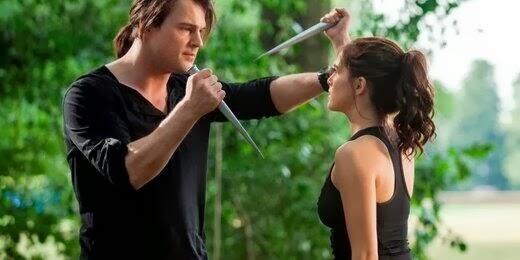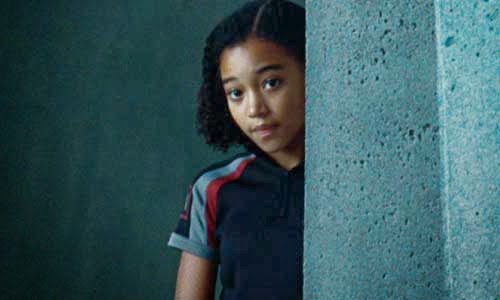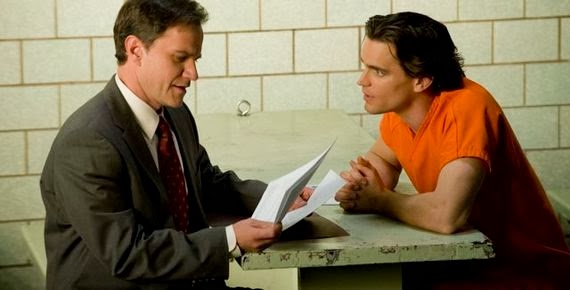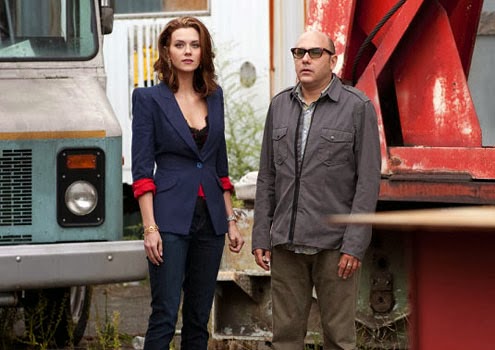January 24, 2014, 9:00 am
I have quite honestly been shocked this year by how much I enjoy Brooklyn 99. I was not overly fond on the first viewing - Andy Samberg's character annoyed me and I just wasn't sure that they would be able to pull this off. It looked to me like the whole show was going to be brought down by some annoying white guy jokes, while everyone else looked on and cringed.
As it turns out, I was wrong. And I am 100% okay with that, because that means we get this show. This wonderful, weird, amazing little show. I'm honestly quite grateful for that. Allow me to tell you why.
Brooklyn 99 is a show with a concept so incredibly simple that I am genuinely shocked no one did it before: it's a workplace comedy about cops. That's it. How the hell is this the first major show like that? I mean, The Unusuals tapped some of the same points, and was awesome btw, but since it had a stronger affinity for drama, it got lumped into the already over-saturated cop drama pool. Brooklyn 99 is a comedy, and I don't know if I've ever seen a straight up sitcom about cops before. Have I? I feel like I would remember that.
The real strength of the show, though, is in its characters, and for me, the strength of those characters is in the way that every single one of them, down to the weird terrible ones, is a developed, interesting person. It's like Christmas and magic all at the same time.
I mean, yes, you've got Andy Samberg playing Detective Jake Peralta (actually, they're all detectives, so I'm not going to use that as a modifier, because it'll take too long), and he is kind of really annoying, but get this. That's the point. Jake Peralta is supposed to irritate you. You're supposed to be exasperated with him most of the time. And yeah, you kind of like him, because the show manages to delve ever so slightly into the psychology of a man-child working as a detective who has so, so many unresolved issues and needs a therapist more than pretty much any tv character since House, and I should hate Jake. But I don't.
![]()
Especially one Detective Rosa Diaz (Stephanie Beatriz).
The reason I singled Rosa out for SFC Friday (and that's not to say that we won't talk about the two other women on this show at some point in the future, because I'm sure we will) is because out of all the female characters I've seen, Rosa is probably the closest to the "strong female character" ideal, the one that everyone talks about and critiques and complains about. And I mean that in a good way. Rosa is the strong female character in a comedy, and it works. It works so dang well. It works because everyone takes it completely seriously.
When I say that Rosa is the "traditional" strong female character, what I mean is this: Rosa is scary. Terrifying, actually. She's got the kind of stare that makes you want to hide behind a desk, she almost never smiles, she hates everyone (openly), and she is very, very happy to use physical force to get what she wants. She's not a woman in a man's world, she's a Rosa in Rosa's world and all of you are unlicensed trespassers. She has a gun. She will shoot.
But she's also got depth. Because even though Rosa is a stone-cold badass, she's also a person, and this show is awesome enough to want to highlight that.
So we find out that Rosa went to Catholic school for a while, and left, not because she was kicked out, but because she got accepted into ballet school. Of course, she did get kicked out of ballet school for punching ballerinas, but still. We find out that she hides weapons all over her apartment, but that she also believes that people should be treated honestly and well, and that she hates having to lie. Not that she won't, but that she really doesn't like it.
She's loyal - her friendship with Jake has gotten them through a lot of scrapes, and it sustained them both through the police academy - but she's also comfortable with her boundaries - when Jake betrays her trust, Rosa does not hesitate to get her revenge (and oh is it sweet). In short, we love Rosa because as much as she is kind of totally a stone cold bitch, and she would feature very easily in one of Kate Beaton's "Strong Female Characters" comics, she's also a person, and a dang cool one at that.
Plus? She's got female friends, strong female relationships, and doesn't feel threatened by other women. She's not one of those, "No, I don't like women, I like men better," people. She doesn't like anyone, not really. But it's not about her being such a cool woman, and therefore being the exception to the rule that women suck. Rosa is a woman who is cool, and she has women friends and man friends, and she sees no reason why that would be a problem.
However. As much as I love Rosa, sometimes I get the feeling that the show doesn't feel the same. Or rather, that the show doesn't understand why I love Rosa. I love Rosa because she is hilarious and terrifying and utterly unapologetic. But the show seems to think that I love Rosa because she's funny, and I'll love her more if she ends up dating this schlubby white guy with whom she has nothing in common and whose pursuit of her is reaching terrifying levels.
Um, what?
The character in question, Boyle (Joe Lo Truglio), is Rosa's partner. And that's fine in and of itself. Actually, I really love Boyle's character when you view him on his own. He's the perfect counterpoint to Rosa. While she's all traditionally masculine attributes wrapped up in an attractive lady package, Boyle is a very traditionally feminine character, who still manages to be a very good cop. They really do make a great team. It's really funny watching Boyle go on and on about his foodie preferences, trying to be butch and manly and then putting together a dollhouse, or accidentally spewing honesty all over everyone.
The problem comes in with the way that the writers have made Rosa and Boyle interact. Because Boyle has a crush on Rosa. And the writers seem to believe that if he keeps bothering about her, it'll happen. Which is just wrong.
Look, I'm even okay with having Boyle having a crush on Rosa. She's a BAMF, and totally crush-worthy, and one of my favorite running gags has to do with all the guys she arrests being pretty much in love with her. It's not hard to tell why. Rosa is one of those characters where you know she could have either been a cop or a terrifyingly effective and unrepentant criminal, so, again, it makes sense. And it's funny. It just makes you like her more that she always shuts these guys down, quick and efficient. No flirting or prevaricating, just, "Ew. No."
I'm pretty sure that's an actual quote, too. *Swoon.*
But the thing with Boyle is a problem. Boyle has a crush on Rosa, which is fine, but the way he pursues her is really, really unsettling. Oh sure, parts of it are funny on their own. He's obsessed with her, but she terrifies him (understandably), so when she actually agrees to go to a film festival with him, Boyle freaks out and buys a ticket to every single movie, because he doesn't know what she'll like and he's afraid to ask. On its own, funny. But combined with everything else? Weird.
Because Boyle keeps pursuing Rosa even when it's clear she's not interested. Even when it becomes so clear that he can't take a hint that Rosa straight up tells him she's not interested, and Boyle claims he'll respect that decision. He looks like he's going to move on (which would be healthy and normal), and then he pulls some crap like this: "When you do go out with me, and I know you will..."
Ew. No. Stop. Gross. What the hell, guys? When you do go out with me, and I know you will? That's what a stalker says about three days before the police catch him wearing your skin.
I really respect the way that the writers have written this relationship, up to a point. I really loved that Rosa likes Boyle as a person, and doesn't want to hurt him, but has absolutely no interest in him romantically. That's fine. There's no reason why she really should like him, honestly. Yeah, he took a bullet for her, but it was a cop thing, not a romance thing. They have nothing in common. He's not her type. So, yeah, she's going to let him down. She respects him, so she's going to let him down gently, but it's not her thing. She's going to tell Boyle the truth and then proceed to not date him. Respect.
It's just that Boyle doesn't stop. He doesn't stop going after her, and to this point, at least, the writers haven't made it clear that this behavior is not okay. Dude. You tried, she said no, the thing to do now is accept that gracefully and move on.
All this? It's creepy. No. Stop.
I guess what I'm saying is that I love Rosa Diaz, and I feel protective of her. Not that she really needs my protection in story, but I feel like she might need it from the writers. She's such a cool character. She knows exactly who she is, and she likes it. She's not burdened with an over-amount of guilt, she doesn't really doubt herself, and she's completely comfortable with her own attractiveness, physical competence, everything.
Heck, she even goes so far as to intentionally perpetuate terrifying myths about herself because she thinks it's fun. I love that.
What I don't love is the idea that Rosa should in some way change or bend or lower her standards to date Boyle. Because she is genuinely not interested, and the narrative would have to do a lot of work to explain why the hell she should be. Don't go trying to make me think that Rosa is being a bitch for not dating him. She's not. She's being honest.
When did that become a crime?
![]() |
| Never change. |
↧
January 27, 2014, 9:00 am
I feel like someone took a brick and smashed it into my face. Now, part of that is because my "weekend" was hilariously stressful and also productive (if by hilarious you understand that I am being deeply sarcastic), but another part is because I have now finished season one of Dracula, my friend, and I am having feelings.
Negative feelings, mostly, which shouldn't come as a very big shock.
Just to recap, though, for those of you who "have lives" and "go outside" (weirdos), the show we're referring to here is NBC's Dracula. Based on the Bram Stoker novel of the same name, and gleefully ignoring all previous cinematic interpretations, the show stars Jonathan Rhys Meyers as the titular vamp, who has decided to pretend to be an American named Alexander Grayson and prance around 1880s London with Tesla's electricity models and a desire for human blood.
The basic plot of the show, from what I can gather after having watched every single episode, is that Grayson, or Dracula, has a grudge against the Order of the Dragon, a medieval order of vampire hunters who are the ones who turned him into a vampire in the first place. Why an order of vampire hunters existed before vampires, and why they would want to turn someone into a vampire at all, are questions best left unasked.
Because Grayson is a sneaky SOB, and also kind of weirdly abstract, he decides that the best way to ruin the Order of the Dragon is not to kill them, but to ruin them financially and then, presumably, kill them. Apparently taking their money is the only real punishment he can think of.
It's not enough to take their money, though. He has to take it in style. And since the Order of the Dragon is also an investing club for the rich and powerful (just go with it), and this investing club has put all of their money into oil shares in the Ottoman Empire (again, just go with it), the only sensible solution is to buy up a bunch of Tesla's electricity patents, pretend to be an American entrepreneur, and give London free, experimental electricity that will eliminate the need for oil and therefore render the Order of the Dragon's investments worthless.
Obviously that is the simplest plan one could come up with. Totally.
Grayson can't do this alone, of course, because a plan this complex and needlessly stupid needs a lot of moving parts. To that end, then, he has recruited Dr. Van Helsing (Thomas Kretchmann), who hates the Order of the Dragon because they murdered his family and apparently is a-okay with vampires in this version, and Renfield (Nonso Anozie), an educated American black man who spent some time as a slave and now works for Grayson because of reasons.
Both Van Helsing and Renfield know Grayson's secret, that he's actually Dracula, and both of them seem to be perfectly okay with helping him destroy the Order of the Dragon. At least at first.
While Grayson is gallivanting in London, however, his eye catches on the lovely Mina Murray (Jessica De Gouw), who looks uncannily like his dead wife for plot reasons. By which I mean that their resemblance is never explained at all even a little bit and we're all just supposed to go with it. Naturally, Mina's boyfriend, Jonathan Harker (Oliver Jackson-Cohen) doesn't particularly like this weird American sniffing around his girlfriend, especially since he's already insecure about their relationship. (Mina's a modern woman who wants a career, while Harker is a working class social climber with ambitions of normalcy. It's wacky fun!)
Also there's Lucy Westenra (Katie McGrath), who apparently is in love with Mina too, but less open about showing it because this is 1880s London after all. And apparently Mina Murray is the hottest thing around? No, seriously. Someone explain to me why all three of our emotional leads are in love with the same admittedly nice but incredibly bland woman. Please.
Anyway. Grayson wants Mina, but he also wants to get Harker out of the way. So to do that, he hires Harker to work as his second in command, which enables Harker to financially support a wife, and allows Mina and Harker to get engaged. Good plan!
Then he repairs the cracks in their relationship, only to later seduce Mina into emotionally cheating on Harker, and then yell at Harker, and then crush Harker's job prospects and respectability because he can, and then flip out at Lucy for breaking up Mina and Harker because nothing Grayson/Dracula does in this show makes any freaking sense whatsoever.
I mean, there are other things that happen in the show, but none of them really make any more sense than what I've already outlined.
Grayson starts an affair with Lady Jayne Wetherby (Victoria Smurfit), presumably because he has sexual needs that he can't bring to the sainted Ms. Murray. Oh, but wait! Lady Jayne is actually a legendary vampire hunter...who is utterly incapable of detecting a vampire even when she's having sex with him. I don't know, just go with it.
And Van Helsing is developing a serum that will allow Dracula to walk in the sun, but the science is super vague, and then Dracula starts being a jerk to Van Helsing, and Van Helsing goes off the rails and murders some guy and his entire family and this show is really weirdly bleak but also terrible. Why did I watch the whole season? Why?
Well, I do actually know the answer to that. You see, Dracula is a show that really should work. Honestly, it should be amazing. You've got incredible actors, a fun premise (Dracula, Tesla, and a bunch of evil vampire hunters romping through Victorian London!), and some pretty decent production values. How is this show terrible?
I mean, one reason is definitely that they tried to fit way too much in there. Between the revenge plots and the fourteen kajillion characters and the constantly shifting moral landscape, it's just too much to handle. I needed to read recaps of the episodes I'd just seen right after I watched them in order to figure out what was going on. And I'm still not sure I totally got it.
On top of that, the show is really ambiguous emotionally. I mean really, really ambiguous. It's not so much that you're not sure whether Grayson/Dracula is the good guy or not, it's that you literally have no idea of the objective morality of anyone on the show, because the show refuses to give you enough information to make an informed decision. We know that the Order of the Dragon killed Van Helsing's wife and children, and we know that they killed Dracula's wife and turned him into a vampire, but why?
No, seriously, why?
We have to stop for a second and wonder if perhaps the Order of the Dragon had a good reason to do all that. I'm not saying that killing children is ever okay, but we seriously know nothing here. We are never told or given any indication why the Order of the Dragon decided to murder some nice guy's family and some other dude's wife. And, honestly, I kind of wonder if they had it coming.
Because here's the thing: while I can't tell whether or not the show wants me to like Grayson/Dracula, I really don't. He's a jerk, a pig, and generally everything that I hate in one slicked-back, bad accented package. So it's already kind of hard for me to sympathize with him. But there's an imbalance of narrative here. I know that he hates the Order of the Dragon, but I don't know why they hate him back, and until I know that, I can never really sign on here. And since he is such a jerk, I find myself siding with them.
But the real reason why the show just completely loses me and is completely awful is that no one's decisions, especially not Grayson/Dracula's, make any freaking sense whatsoever. At all. Ever.
Grayson wants revenge on the Order of the Dragon, so he pulls an incredibly long con to get them to go bankrupt, and then decides to murder a bunch of them for kicks, and then immediately go back to the plan like nothing changed? What?
Grayson wants to make sweet sweet love to Mina Murray, so he hires her boyfriend who then becomes her fiance then manipulates their relationship, hosts their engagement party, passively watches them break up and get back together multiple times, then murders the person who actually does break them up (Lucy)? Huh? As Patrick from Piece of Cape put it, "He should be sending her chocolates and flowers, not killing her!"
For that matter, when he kills Lucy, because she's "behaving like a monster", a presumed reference to both her crush on Mina and her sleeping with Harker, he decides to make her into a vampire. Why? If you really hate someone, why the hell would you arrange it so that you have to share eternity with them?
These are only a couple of examples, sadly, of the horrific gaps in logic that run rampant in this show. It's like the writer's team has never actually met a rational human, they've just heard vague rumors and decided to try to imagine what a normal decision making process looks like.
And despite all of this, all of the crap and weirdness and terrible life choices of every single character and the way that the show is really aggressively not as good as it could be, it's still apparently coming back for a second season.
So I think the thing to do right now is to go outside, stare up at the sky, and mutter "Why?" to yourself a few times. It's the only thing I can think of that will help.
Well, that or just changing the channel and watching Sleepy Hollow instead. That works too.
↧
↧
January 28, 2014, 9:00 am
Okay, so as some of you know, I have a whole bunch of jobs (because being professionally angry about injustice isn't a particularly lucrative gig - yet), and one of those jobs involves taking care of very small children. Two of them, to be precise, both genders, one quite a bit smaller than the other. It's actually this kid taking care of -ing that inspired me to start Think of the Children! Tuesdays in the first place, because I saw some of the crap that people are putting out and slapping a "children's" sign on, and I got pissed. Like you do.
The thing is, it's all well and good complaining about the movies and televisions shows that we make for children, and trust me, I'm not giving up on that, but you have to bear something in mind here. Most kids, at least most kids I know (and I know a surprising number), get a lot more exposure to media and bias and all that crap through books, not movies and TV shows. Why? Because if you're a thinking, feeling, reasonably invested parent, you're probably already aware of the crappiness of most media. The parents I nanny for are really aware of how much time their kids spend looking at a screen, and seek to monitor it. Keep it as low as possible. That's great!
The flip side of this, though, is that books, for the most part, really aren't all that much better than movies and TV shows for representation. And sometimes, they're actually aggressively worse.
But we're going to hold off on the doom and gloom for another week or so (when we'll be talking about some of my all time least favorite kids' books - I'm sure you can't wait!), and today we're going to discuss a book that I think is absolutely amazing and should be required reading for not just every child, but every high schooler, college student, and grumpy adult. Ever. All the time.
We're talking about Alexander and the Terrible, Horrible, No Good, Very Bad Day, by Judith Viorst, and illustrations by Ray Cruz. I'm actually pretty happy because I don't think anyone's ever tried to top Cruz's illustrations, as well they shouldn't. He's got the feel of the book down perfectly.
Anyway, since this is a kids' book, it's not too hard to summarize. In fact, a lot of you already know about it, or grew up with it, or read it to your own kids. It's been around since 1972, and from what I can tell, it's been resonating particularly well ever since. What's it about?
Alexander. Who is having a very bad day. And then who goes to bed.
That's it.
No, seriously, that's all the book is about. Alexander wakes up with gum in his hair, his brothers get cool cereal box prizes and he doesn't, he gets squished during carpool, his friend is mean to him, his mom packs him a super lame lunch, he gets in trouble at school, he has to go to the dentist, he has a cavity, he fights with his brothers, he has to eat lima beans, he has to take a bath, there's nothing good on TV, and his parents won't let him move to Australia. Then he goes to bed.
I realize that this doesn't really sound revolutionary as far as books go, but allow me to explain. You see, children's literature is usually much more of the perky, "I'll love you no matter what, yes, even if you poop in my jewelry box," and, "Hands are for hugging not hitting!" and "You can be anything you want to be, and screw anyone who says differently!" and "It's okay - no matter what happens it'll always get better," types. Books that are big and primary colored and morally simplistic. Which is, again, fine. In moderation.
Out of moderation, though, and let's be real, if any of you have ever tried to read "just one" book to a toddler, you know what I mean, these books start to grate on your very soul. Their unrealistic representations of relationships, work, family, friendships, potty training - it just starts to make you mad. Not because there's anything inherently wrong with loving unconditionally, not hitting, aspirations, or hope, but because if you feed kids a steady diet of sweet, saccharine moral pablum, they grow up to be, well, jerks.
That, and they end up with grossly unrealistic understandings of the world. They expect it to entertain them all the time. They expect things to work out quickly, because everything's always okay by the end of the book.
They start to think that there must be something wrong with them, because it's not super easy and fun and colorful and quick. Kids are really fast to internalize stuff like that. And that idea that something is wrong with them? That's the first thing they'll pick up.
Also, it's just annoying for me personally. There's this one book, No More Diapers for Ducky, and in it this little duck comes over to play with her pig friend, but he's in the potty, so she plays without him (he is apparently in there for literal hours), and then she decides that she wants to use the potty. So she takes off her wet diaper and leaves it on the floor and then barges into the potty because no more diapers for Ducky! Yay!
Are you freaking kidding me? Do you, author, know what potty training is really like? POTTY TRAINING IS HORRIFIC AND YOUR BOOK ONLY MAKES IT MORE SO.
Anyway.
The thing about Alexander and the Terrible, Horrible, No Good, Very Bad Day is that it isn't easy. It isn't primary colored. It doesn't get resolved in the end. All that happens is that Alexander has a genuinely bad day, and then he goes to bed. You know what his mom says at the very end of the book?
"My mom says some days are just like that. Even in Australia."
First off, I love this kid because he is constantly wanting to move to Australia, which is rad and I approve of his life choices. Second, I love this kid because he is such a little grump and I relate. But third, I love his parents so, so, so much for that line. Some days are just like that. Because, well, they are.
Everyone has bad days. It's part of being alive. Some days just suck. And you have to choose to have a good attitude to get through them. You have to try. It takes work. And you know what? That's okay. That doesn't mean there's anything wrong with you. It just means that you had a bad day. That's it. Bad days happen.
These are the books we need more of, to be honest. The books that tell you something you desperately needed to be reminded of, and the ones who do it with a smile and a pat on the cheek. So, you know, everything by Judith Viorst and Dr. Suess. And some other people, I guess.
Next week, like I said, we're going to look at some of the books I hate the absolute most when it comes to children's lit, but for today, we'll end on a high note. Or as high as a note on a post about bad day books can be. Some days are just like that. And if you're having one of those days today, just remember: it's okay. It might not get better today. But you can always go to bed.
I want that on a t-shirt.
![]() |
| I hear you, kid. |
↧
January 29, 2014, 9:00 am
You know how sometimes you love a show so much that you never finish watching it? Like, I still haven't seen the last three episodes of Pushing Daisies. Why? Because after I watch those last three episodes, it's over. There will be no more Pushing Daisies for me to watch.
And while a huge part of me is super OCD and really wants to cross that show off of my incredibly massive and ever expanding list, there's another sentimental part of me that refuses. That can't watch those last three episodes. That doesn't want the magic to end.
Last week I finally watched the last season of Leverage, a show I have loved since before its first episode, and while the show is now, for me, definitely over, I'm happy to report that it ended in such a way as to make sure it lives on.
Okay that was really confusingly worded. What I mean is that while I have now seen all of the Leverage there is to see, the ending was good. Better than good, it was great. And it ended the same way it started, which means that somewhere out there I get to pretend the show is still going on and the Leverage crew are still out there doing good things, and everything is just fine and dandy.
And I'm going to keep telling myself that even as I sniffle loudly into my comforter. For the record, this isn't going to be a review so much as a love letter. You have been warned.
For the uninitiated, of which there are probably more than a few, Leverage is (was) an hour long heist show that aired on TNT. It follows five criminals who have decided to use their criminal superpowers to help normal people get one over on The Man. It was also kind of weird and kooky and much stranger and less commercial than your average show, even on TNT, and was constantly in danger of being cancelled. Like, constantly. I remember being sure it was over after season two. Shockingly, however, and with much thanks to a healthy amount of product placement (I'm pretty sure that seasons four and five were literally sponsored by the city of Portland, Oregon), the show managed five whole seasons. And that's awesome.
![]()
Sorry. Got a little creepy there.
Like I said, the real joy of Leverage isn't in the awesome cons or even in watching rich people get what's coming to them (the loss of their money and occasionally jail time) every week. It's in seeing the ways that the characters interact with each other and seeing how being together, helping people, and being a family change them all.
It's part of the conceit of the show, actually. You see, the supposed main character (we'll have more on that in a minute) is Nate Ford (Timothy Hutton). Nate is a former insurance investigator for a major company, and during his time at IYS he investigated a lot of criminals at the top of their fields. He ran into Sophie Devereaux (Gina Bellman), a stunningly talented grifter who is also a terrible actor when she's not robbing people blind. Oh, and Eliot Spencer (Christian Kane - the reason I tuned in in the first place), a "hitter", or the muscle, who happens to have very strong feelings about why guns are bad and oh by the way he's a gourmet chef. And terrifying.
And then there's Alec Hardison (Aldis Hodge), an alarmingly talented hacker and computers expert, who lives off of orange soda and stolen sandwiches (sorry, Eliot), and once missed a con because he was up late watching Doctor Who.
But mostly, there's Parker (Beth Riesgraf), a thief of the highest order (she literally has kleptomania and is in one episode put on Prozac, which cures her, but also makes her mildly psychotic-er). She's deadpan and deeply divorced from the human spectrum of emotion, mostly as a result of her horrific childhood, and she kind of sort of likes jumping off of buildings. Also money. Parker is probably the closest thing this show has to a real protagonist, and we'll have more on that later. Anyway.
Anyway. Nate Ford is the only one of these guys who isn't a criminal, but that's mostly a technicality. When he wants to do a job, and he finds out that he can do it with these specialists, all of them top of their field, he pulls them in. He makes them work together.
He teaches them how to be good. And in the process, sure, he becomes a little bad. But together they make something. They make a firm. They help people. They help each other. They make a family.
I'm going to let you in on a secret. I came because I love heist shows and movies, and because Christian Kane is dreamy. But I stayed because the relationship between Nate and Parker is one of my favorite things on television, and Parker's story is why the show works at all.
So when the show starts, it obviously has to start with the "meet cute" for all our little criminals. And they all get an introduction that shows you who they really are. We see Sophie being crowned royalty of some tiny European country, Eliot disarming ten men over a baseball card and then casually sipping coffee, and Hardison hacking a hotel and playing Jedi with a bunch of cute girls. And Parker? We see her stealing stuff. Which seems really tame in comparison. Until you see everyone else's reaction to her.
That she's legendary. That she's terrifying. That she is pants-wettingly insane. And here's the thing. The show doesn't disagree with any of those assessments. Parker is legendary, terrifying, and completely insane. She's also a scared little girl who is so afraid of being hurt that she's forgotten how to have feelings at all. She doesn't know how to like things. She's pretty much a feral cat.
And there's a part of me that would be bothered by that, that would kind of hate seeing this awesome female character who's really just scared and needs loved, if that didn't actually describe all of the rest of the characters as well. The only differences here is that Parker is a lot further gone than the rest of them, and that we get to see her come back.
Like when they run a job on a con group doing human trafficking out of Eastern Europe. Parker immediately relates to these kids, who have family and home and shelter dangled over their heads only to be drawn further into a scheme, and she decides to save them. No questions just, "I don't care if you don't help me, I am going back for those kids." And she does. She saves them.
But in that same episode she also stabs a man with a fork and about an episode later she calls a girl fat, and it's clear that our little Parker has a long, long way to go.
The thing is, the character development on this show never stops. It never stagnates because the writers are too afraid of changing the dynamic they already have. It's the rare case of a show where the writers are actually paying attention and willing to go there. Parker has never spent a lot of time around people who get her, so when she does, she starts to change. The show gives us that.
It gives us the first time Parker makes a real friend, one who doesn't do crime. It gives us the first time Parker goes on a date, an actual for realsies date with a nice boy (who happens to be Hardison). It shows us Parker getting excited for Christmas. It shows us how that one date turns into a real relationship, with feelings and fights and growth. It shows us Parker wanting to change. It shows us Parker learning how to like things, really like them.
But most of all, this show gives us Parker healing. Growing past the wounds inflicted on her, and learning to help other people.
Like there's this whole subplot, that runs through the whole show and is absolutely adorable, where Parker and Hardison had to take on FBI cover identities for a con, but on the con they ran into real FBI agents. Fortunately, the FBI agents were kind of terrible and didn't realize Parker and Hardison were faking. The real FBI agents end up getting credit for all the team does, and everyone is happy. And then they run into them again. And again. And again.
Each time Parker (usually Parker) has to convince them to help with the con, and each time the agents get the credit. But they never turn out to be bad guys or anything. Just a little dim. One of them, Agent McSweeten, even has a crush on her, awwww. It's doubly funny because this is early Parker, who has no filter and is wildly inappropriate.
Here's the real thing, though. The show doesn't keep this as a simple gag. No, after five years, Parker and McSweeten actually know each other pretty well. Well enough that McSweeten actually comes to her for help. And Parker, far past seeing him as a weird and pathetic loser like she did when they met, likes him. She respects him. He's a genuinely good guy, and she wants to help him.
For a girl like Parker, who puts the crazy in "so crazy I can't even think of an appropriate metaphor", that's huge. And it is so, so gratifying to watch happen.
I'm not going to lie, the finale of this show made me cry. Not because of the fakeout where they pretend everyone died (seriously, who fell for that?) but for the bit after, where Sophie and Nate take a much deserved retirement, and Parker takes over Leverage International. Because that's the point where we see what all this was about. Nate took Parker in. He taught her how to be a daughter, and then he set her free.
I'm having so many feelings right now, guys. All of the feelings.
It's the rare show that is able to admit that people change over time, and allows its characters to grow and develop. But it's the much, much rarer show that understands that people growing and changing isn't the B plot. It's the main attraction. Parker's emotional stability is the reason you watch the show. That and seeing Nate wrestle his demons. Watching Sophie find herself outside the con. Seeing Hardison become a man and not just a little boy playing with his toys. Watching Eliot slow down, stop looking over his shoulder, find some peace. That's what you tune in for. That's the point of it all.
I really do wish more shows understood that. I think there'd be a lot more appealing television if they did. But until they do, Leverage is on Netflix Instant, and I dare you, I just dare you, not to fall in love with Parker. She is, after all, twenty pounds of crazy in a five pound bag.
![]() |
| You crazy kids. (Literally). |
↧
January 30, 2014, 9:00 am
So I know that I have been a bit of a broken record on the whole Tamora Pierce thing lately (if by broken record you mean "unabashedly singing her praises like a freaking meadowlark). I'm not actually sorry for that, and it's going to continue. I just wanted to let you know that I was aware you might feel like it was getting repetitive.
The thing is, for me, it's not repetitive at all. I get to read these books, these wonderful books with these wonderful characters, and the stories are fun, and the books are progressively better written (for realsies, though, you can tell where the learning curve is), and the female characters are different from each other but still awesome and cool and funny and well written and I just love it all so freaking much. So I'm sorry if you're getting sick of reading about Tamora Pierce books. I'm not. I'm pretty sure I'll never be sick of this.
Actually, I'm mostly getting worried, because I'm now out of Tortall books, and while I'm sure her Magic Circle series is equally good, it's weird and new and I'm scared! Not too scared to put all of the books on library hold at the same time though. Besides, there are like fourteen kajillion of those books, so I should be good for a while.
Anyway, today I finished reading The Realms of the Gods, the fourth and final book in the Immortals quartet, which is actually one of the earlier series in Pierce's Tortall collection. If you're keeping score at home, the timeline (though not the order she wrote them in) goes as follows: Beka Cooper (takes place 200 years before others), The Song of the Lioness, The Immortals, Protector of the Small, and Trickster's. I will actually say that if you have the chance to read them in chronological order (minus the Beka Cooper books, because those mostly stand alone), do it. The books make a lot more sense if you read them in order.
I know that now, because I didn't read them in order. I actually read the Trickster's books first, then Beka Cooper, then Lioness... Yeah, it's been kind of a mess.
Anyways, I've now finally finished all of them, and, yes, everything makes a lot more sense now. I'd been looking at reading Immortals as just another link in the chain between books I liked a lot more and related to better, as sort of an explanation for what happened in those ten years between Lioness and Protector of the Small. But much to my surprise, I found myself really liking them. I mean, it shouldn't have been a surprise. I've liked every single other Tamora Pierce book I've read. But it still somehow was. Good job me, I guess.
The reason I wasn't super enthused in the first place, though, has to do with the main character: Daine. Or, if we're going to be formal about it, Veralidaine Sarrasri. It's a bit of a mouthful, so we're going to stick with the nickname from here out. Daine is kind of the female fantasy heroine I've always hated. Just a little bit. Maybe it's more accurate to say that Daine should be the fantasy heroine I've always hated, but she isn't, and it confused me.
![]()
She's had a couple of tough breaks.
And then she runs into Onua, the horse mistress for the Queen's Riders of Tortall, who takes Daine on as an assistant, and Daine is so nice and kind and good with animals that Onua brings her to the capital where she becomes friends with the king and queen and king's champion and everyone important, but she still stays nice humble little Daine. She finds out she has this special amazing magic that almost no one has ever heard of and she uses it to save the kingdom, and everything is super peachy.
That is the first book. And I don't think I really need to elaborate here, but honest to goodness, I can't stand that whole concept and character arc. Tamora Pierce is a good enough writer that I kept going and I even enjoyed it, but oh was I annoyed. Daine (in the first book, Wild Magic) is everything I hate about fantasy heroines. She's beautiful but not aware of it, and earthy, and super duper magical special in a way that no one else is ever, and also all the powerful people love her without question, and she saves the day, and blah blah blah - long story short, she's the sensitive horse girl. I haaaaaaate the sensitive horse girl thing.
For the love of the writer I kept going, though. It didn't hurt that the plots are pretty fun, and I like Alanna and all of the other characters we got to see again. Numair wasn't so bad. So I read a little further. And that's when stuff started getting...weird.
Have I mentioned that I really like weird?
So in the first book, Daine is all magic and powerful because she can talk to animals, and most people really can't do that. She has this thing called "wild magic" which is really rare and weird, but she uses it to fight in battles and stuff, and while it's a little overdone and silly, it's a neat idea and I liked it well enough. But in the second book (Wolf Speaker), stuff starts getting downright strange. This book has Daine and Numair (super powerful mage, Daine's tutor) traveling to the north again to meet up with Daine's wolf pack - you know, the ones who helped her eat the men who killed her family. Those wolves. Nice guys.
The wolves are worried because something is wrong in their area. There is bad magic around, and lots of terrifying immortals - weird fantasy creatures from the immortal realms that have mysteriously reappeared in Tortall and the surrounding lands - preying on the local animals. Daine is determined to help. But this time, Daine's magic starts to go weird. In a good way. Well, in an interesting way.
This time, Daine can't just talk to all the animals, she needs to be able to see through their eyes, or take their shape, or do fifteen other things in order to get out of the situation alive. Which sounds all god-modded and stuff, until you realize that this is a book where the heroine is sleeping in the dirt and constantly trying to remember to turn her ears back to human so she doesn't go deaf, or figuring out how to hide a tail she accidentally morphed into and can't get to go away, or losing herself in a squirrel's mind. It sounds silly, but it's actually really, really compelling to read. Why? Because Daine is afraid. In this book she's genuinely, really afraid. And what is she afraid of?
Herself.
For me, that's a way more compelling story arc than being afraid that if the others knew how special she was they'd be uncomfortable with her. Daine's fear of herself, however, her fear that she would one day let go and lose all of her humanity is first of all not unfounded, and second, really interesting to witness. She fights it. She loses sometimes. It's good. It's a good book.
And then in the third book, Daine has to stretch even further, fighting not just with animals and immortals, but now with gods and emperors. This third book (Emperor Mage) has her pitted against the master of an empire, trying to solve a mystery, and being tossed this way and that by gods fighting wars best known to themselves. Daine gets pissed. She learns some more. She becomes more comfortable in her own skin. She never stops being Daine, but the thing that is Daine becomes much bigger and more powerful than ever before. Plus, the climax of the book has Daine going on a rampage through the palace while riding a wooly mammoth and commanding an army of dinosaur skeletons (I did not make that up, it is amazing), so, you know, might want to check that out.
But all of this is just leading up to the last book, The Realms of the Gods, where Daine finally has to face her heritage, and deal with the truth of herself and her magic. You see, the main problem I really had with the series and with Daine as a character was that she was so incredibly god-modded. She's all powerful (but still humble) and super duper special (but it never goes to her head). Mostly, though, I always get a little annoyed by stories where thus and such character is the "only one in the world". Come on.
Which is why, in a sense, I should be pissed about the explanation we finally got for Daine's powers. I mean, admittedly, I think the reveal happens in the second or third book, but Daine herself doesn't get confirmation until book four. She's not just god-modded, she's a literal demigod. Her father, he who was never named in her childhood, is actually the god of the hunt, Weiryn, and her mother, who died years ago mind you, has been taken up as Weiryn's consort and a minor goddess: The Green Lady. Daine's powers are so insanely massive and ridiculously specific because she isn't just some girl. She's a god's daughter.
It really does explain a lot.
That's not why this book is so compelling. It's interesting, sure, but the real thrust of the book has to do with Daine's choices now that she knows who she is and where she comes from. She finally has the answers she's been seeking her whole life. The mortal world is wreathed in violence and turmoil, and she could help. Or she could not. She could stay with her mother and father. She could finally be really safe, finally have her family back, finally be free of the worries and cares of power.
It's not really a spoiler to tell you that Daine chooses the harder road, that of a mortal life, but it is important. That was the moment I really learned to love Daine, because that was the moment I finally saw how far she'd come. She wasn't some wilting little horse girl any more, but now she was a terrifying, fierce, powerful woman, who was going to save the world and kill that freaking Ozorne if it killed her. Which it nearly did.
Daine grew up. And as much as she bugs me in the first book, having read the last one, I kind of can't hold it against her. We're all annoying at thirteen. What's important is what we grow into, and Daine grew up good.
Plus, she did finally end up with Numair. Yeah, there's kind of an age difference there, but who cares! He's dreamy and she's lovely. Mazel tov.
I guess what I'm saying, in the end, is that I judged these books a little too harshly, based on my own general annoyance with a trope. I was wrong. They're good books. And while I still don't really like the whole sensitive horse girl thing, at least Daine kicks some major butt. Enough butt that the gods come down and tell her to cool it. I think that's worth appreciating.
↧
↧
January 31, 2014, 9:00 am
Let's all just take a moment, right now, and appreciate the fact that Gina Torres exists. If you aren't familiar with her work, don't worry, you will be by the end of this article, but for the rest of you, don't lie. You know exactly what I mean. This queen has graced our lives in Xena, Firefly, Angel, Hannibal, and Suits, to name only a few shows, and she is freaking amazing. We should be (and are) so very, very grateful.
Anyway, today I want to talk about the character Ms. Torres plays in Suits, the USA dramedy about really, really, disgustingly attractive lawyers. You see, while this show does follow the usual USA pattern of having two male protagonists who play off of each other and are really adorably domestic and cute and all, this show also has something that very few other shows, movies, or even books have. And it's not just Ms. Torres.
No, this show has an honest to goodness female mentor to a male character. And not one where it gets all bogged down in sex or attraction (thank you, Agents of SHIELD). Nope. This is just a case of a woman who has an amazing career, is brilliant at what she does, and decides to bestow a little bit of her wisdom on a nice young boy, who happens to grow up and work for her. The tables are never turned, she's always his superior, she's always one step ahead of him (or indulging him and allowing him to play in the sandbox), and she's always his boss.
And it tastes so good.
So, for those of you who don't watch literally everything that has ever aired on television (that's an exaggeration, but really not by much), Suits is a cute little show with a weird premise: What if your lawyer wasn't really a lawyer? The two main characters are Mike Ross (Patrick J. Adams), a college dropout with big ambitions and a bigger brain, and Harvey Specter (Gabriel Macht), a high falutin' lawyer with the biggest ego. Together, they solve cases, fight evil lawyers, and bring something vaguely resembling justice (but more resembling my sense of disgust with corporate America) to the small screen!
Or, to be more technical about it, Harvey is a bigshot lawyer who works at Pearson-Hardman. The Pearson in that name is for Jessica Pearson (Gina Torres), an awesome lawyer who mentored Harvey all the way from the mailroom up through law school. Now he's just made senior partner at her firm, and Jessica has one last (haha, not really) demand of Harvey: hire an associate.
I have learned a surprising amount about the way lawyers work from watching this show, and while I have no idea how much of it is accurate (probably a fair amount, USA is good like that), at least in the universe of the show, this is how it works. If you're very smart, you get into Harvard Law. If you graduate Harvard Law and are very good, and also pass the bar, you maybe possibly could try to get hired by Pearson-Hardman. Not as a lawyer, but as an associate. Basically a paid intern. Then you spend several years getting spit on by the partners, before you maybe hopefully get put on partner track, and then a few years after that you might make junior partner, and then someday, maybe, just maybe, you'll make senior partner.
Harvey, as a senior partner, now needs to have an associate of his own. He doesn't want one, because he's kind of a misanthrope (respect), but Jessica is forcing his hand. So he does interviews (alongside his implausibly amazing secretary, Donna - played by Sarah Rafferty), and into those interviews accidentally strolls Mike. Mike is avoiding the cops, because he's carrying a briefcase full of weed. Mike has made some poor life choices.
But Mike is also a card carrying genius who passed the bar for the hell of it, and since Harvey likes spunk and brains, and apparently enjoys a project, he hires Mike. And they lie to Jessica about Mike's credentials. Thus the conceit of the show is born. Mike is technically a lawyer, but he never went to law school, so if anyone finds out about him, all of Pearson-Hardman's cases will be called into question. That's the central tension of the show.
And for the first season or so, at least, the real emotional tension in the show has to do with Harvey keeping this huge secret from Jessica. She is his mentor. His Yoda. She is the one who saw a little spark in a screwed up kid and decided to help him. And he's lying to her.
Is it wrong that I love watching Harvey feel like crap? Don't answer that.
Now, Suits is cute and all, but the real thing I want to focus on here is the relationship between Harvey and Jessica. Because, and I can't stress this enough, it is super rare.
I actually had this conversation with Kyla (from gamEstrogen) a few weeks ago: name any female mentors of male characters who are not relatives or love interests. And here's the thing. While I could name a few, one of which was Jessica, I could only name a few. I don't want to brag, guys, but I know a lot of pop culture. A lot. And if I could only name a few female mentors, especially ones where the mentorship was vital to the plot, well, that speaks volumes in and of itself.
But Jessica and Harvey. That's the relationship they have. She is the one who taught him all his tricks, and he is the heir to her kingdom. It's not really a mother-son relationship, they're not siblings, and even friends is probably putting it a little wrong. There's no other way to explain the relationship that they have other than to say that she is his mentor. And he is gutted by having to lie to her. Then she's betrayed by having been lied to. And it's kind of a little bit wonderful?
Because Harvey isn't shown to be in the right all the time. This really comes down to dynamics of power. Harvey is an upper class white dude. He's attractive (really attractive), rich, powerful, and pretty much the epitome of patriarchal privilege. And who is his boss? Who is his Yoda? Who is the person calling the shots in Harvey's life? A black woman.
If you don't think that is crazy revolutionary, then you need to stop and really reexamine your life.
Jessica Pearson is a black woman running the most powerful law firm in New York City. She has billionaires eating out of the palm of her hand. The best closer in the city used to be her mail boy and is now her not-so-secret weapon. She is a woman in command of her own life. She is not a hot mess. She is not a woman who needs to be saved. She is glorious.
I'm just saying, this is the kind of representation we want on television. Can you imagine being a little girl and looking up at the screen while you watch a show you don't understand (because I barely understand it and I have a Master's degree), and seeing this amazing, smart, beautiful woman schooling all the guys in the room? Can you imagine growing up and wanting to be like that? Doesn't that make you happy?
Sure, there are parts of Jessica's storyline that I'm not super hot on. That's life. And, admittedly, I tend to really only watch Suits in bursts, because it can get a little repetitive. When I do watch, though, I watch it for Jessica. And Donna and Rachel, too. Because these are strong, powerful, beautiful women, who do not apologize for being strong, powerful, and beautiful women.
And that's something I need more of in my life.
![]() |
| I love yoouuuu. |
↧
February 3, 2014, 9:00 am
Okay, so I live in the Seattle area, and yesterday, during the Superbowl, I was at this loud party with all my friends and their families and tons of people yelling and screaming and eating skittles (long story, I don't quite understand), and with my brother-in-law shouting in my ear, and throughout the whole thing, do you know what I was doing?
I was on tumblr, regaling my one non football friend (well, my one non-football friend at this particular party) with the hilarious plot and juicy gossipy stories from Reign, the CW's most recent attempt to really corner the market on things that make teenage girls squee. I spent hours just going through tumblr, looking at gifsets and caps and interviews and headcanons, and trying to figure out why it is that this show gets me all twisted around inside. Why do I love it so much? Is it an objectively amazing show?
No, I'm really asking. Because I can't be objective about this. From where I'm standing, Reign is awesome, because it has solid writing (I can't think of any episodes that didn't work, that weren't engrossing, or that had spotty characterization), great acting (no, seriously, great acting), a fun cool concept, and really genuinely gorgeous sets and costumes and all that jazz. I enjoy the ever loving crap out of this show, but it seems like no one else even knows that it's on.
What gives?
So, Reign is a new show. It just started this year. And the concept, while cool, is a little complex. It's a historical fiction - or maybe historical fanfiction would be more accurate, but we'll discuss that more later - about the life and loves of Mary, Queen of Scots. If you vaguely recall from history class, Mary was around at the same time as Queen Mary of England, and was of approximately the same age as Elizabeth I. She had some claim to the throne of England, and full right to Scotland, which she had ruled since she was a girl. She was then engaged to the Dauphin of France, in an alliance that had the potential to sweep up half of Europe.
![]()
It's a thing, is what I'm saying. The show is a thing that now has a life of its own, and I'm not sure how to stop it. I'm not sure I want to stop it. I'm just having so many feelings.
The show starts when Mary (Adelaide Kane) returns to the French court after being raised in a convent. Mary's life is in danger, and she needs to solidify her alliance with France right the crap now, or else the English are going to kill her. Unfortunately for Mary, though, while she is engaged to the future king of France, Francis (Toby Regbo), she cannot marry him until King Henry (Alan Van Sprang). And Henry won't agree until it suits his purposes. So now she's stuck in limbo at French court. She's falling in love with Francis, but he won't make a move until his father allows it, and meanwhile his bastard-born brother, Bash (short for Sebastian, played by Torrance Coombs) is over there being all attractive and flirty.
It's enough to make any girl feel a bit woozy. And then there's the prophecy. What prophecy? Oh, just the prophecy made by Nostradamus (Rossif Sutherland) to Queen Catherine (Megan Follows), that if Mary and Francis wed, Francis will die. Catherine's not about to let her baby fall to some Scottish curse, and she's going to do everything in her power to stop the wedding. Up to and including murdering Mary.
But that's not all. Nooooo, that would be simple. There's also Mary's Scottish ladies at court, who all have their own intrigues and love stories and political plots. There's Kenna (Caitlin Stasey), who has been chosen as consort of the king, much to Catherine's displeasure. And Greer (Celina Sinden), who needs to marry a nobleman to save her family, but has fallen in love with a kitchen boy. Plus, we can't forget Aylee (Janessa Grant) and Lola (Anna Popplewell), Mary's advisors and spies at court.
I forgot to mention that there's a mysterious probably not ghost running around in the walls of the castle who doesn't talk but does wear a sack on her head and murders people sometimes. Also, pagans in the woods who like to make human sacrifices.
Man is this show insane. And I love it so freaking much. Why? Well, probably because it is insane.
Here's the thing: when I say that Reign is really historical fanfiction, I don't mean that in a bad way. Not at all. I love fanfiction. Love it. Fanfiction is what happens when fans (mostly women) dominate a media space - the media is recontextualized and turned into a medium for emotional expression. That's what's going on here with Reign. It's fanfiction, insofar as most of the really juicy stuff isn't particularly historical, but that's not a bad thing. The juicy stuff, like a prophecy of doom, or murder attempts, or mysterious pagans, all serve to advance the character developments. Not so much the plot, but then, there really isn't much plot in the show. And, again, that's not a bad thing.
Like, as far as I can tell, the plot of the show is: Mary is Queen of Scotland and should probably marry someone at some point. Also, Francis might die if she marries him. But she loves him! Also pagans.
There really isn't a whole lot to go on. It's Catherine scheming against Mary, or Kenna dreaming of how she's going to be the queen of France, even though we all know that would never, ever happen. It's Bash making moon eyes at Mary while she and Francis debate politics and even though there isn't some big goal hanging over our heads, that doesn't make it bad. It's great. It means that the only story we're really concerned with is what's going on in the hearts of the people on our screen.
SPOILERS for the most recent episodes.
I started thinking of this a few days ago, when I finally caught up on the more recent episodes. In them, Mary and Bash run away from the castle. Mary because she's just learned of the prophecy, and has decided to save Francis by breaking his heart, and Bash because his mother has decided to try to have him legitimized, which would make him the next king of France. And they're both afraid for their lives.
![]()
Well, a real TV show that isn't Game of Thrones and has sweeping montages and lots of romance and longing and big romantic gestures and pretty dresses. It's like if Game of Thrones had a baby with a romance novel. That's what this show is.
Have I mentioned that I love it?
And then in another episode they have to sneak Bash's cousin out of the castle, but, whoops! She's about to have a baby, so we have to deliver the baby in the woods, and then the mother dies, and pagans come and are creepy, and then the baby must be disappeared into the royal nursery, all while everyone plots against Bash's life, and I'm just sitting there going, "This is fanfiction. This is AU fanfiction. And it's amazing."
It's amazing because when you get stories that take character development and emotional stakes seriously, you're usually talking about shows like Game of Thrones or Breaking Bad or Mad Men. Shows that are gritty, tough, or deep. Shows with brooding leading men and huge casts and intense anti-heroes.
Not usually shows about pretty girls in nice dresses who are beloved of the handsome boys and also have their own castles and kingdoms and lots of female friends and are really really smart to boot. Mary is a total female power fantasy, with her power and intelligence and political acumen and really handsome love interests, and that's not a bad thing. Mary is a Mary Sue, in the most general of terms, but that's fine. I mean, everyone's totally cool with watching Batman swan around for three hours, what's wrong with getting to see a brilliant, commanding, feminine woman school a bunch of old men on how to govern a country?
![]()
Plus, she's a female character whose main friends are all female, whose main antagonist is female, and whose main advisor (her mostly off screen mother) is female. The men are mostly there as parts of Mary's love story. And while they struggle against each other for her affection, they don't ever call her a whore or accuse her of leading them on, or in any other way cast their hurt feelings onto her. Mary is the Queen, and you will respect her. It's kind of really nice to see.
I guess what I'm ultimately saying is that Reign feels like fanfiction because it's a juicy, well written, engrossing show about a strong female lead who has a strong female antagonist, and a bunch of attractive, nice, not jerk face boyfriends, and a whole host of girl friends, and she's a BAMF at her job but still gets to wear pretty dresses, and there's some part of me that is so used to Hollywood rejecting all of those things that I refuse to accept it as real.
It can't be real. It must be fanfiction.
↧
February 4, 2014, 9:00 am
Last week we talked about a book that represents the best of Children's Literature. This week, let's talk about some that represent the absolute worst. Now, bear in mind that the qualifying factor here is that I think all these books are terrible, and also that, for some unknown and ideally unfathomable reason, they're super popular.
I didn't put all the stinking truck books on here, the ones that I hate but the little munchkin loves, because while I am sick to death of reading about monster trucks and semi-trailers and snowplows and what the poop ever else, they're not really offensive books. Just kind of annoying in their volume.
These, however, are the books that I really do find personally offensive. Or just irritating. But either way, I find these books to be genuinely detrimental to children everywhere. Why? Well, check it out:
No More Diapers for Ducky! and No More Hitting for Little Hamster! by Bernette Ford. (Illustrations by Sam Williams).
So, I just looked online, and apparently these are not the only two books in the series. And while I haven't read all the rest of them, I'm going to make some broad generalizations here, because I can and I'm sure I'm not wrong. These books suck. They are everything that is wrong with America.
Okay, that might be overselling it a little, but I really do dislike these books. In No More Diapers for Ducky!, like I mentioned last week, the story follows a little duck who goes over a friends house, finds him using the potty, kicks off her diaper and decides to be potty trained. Just like that. In No More Hitting for Little Hamster!, the titular rodent is a jerkface who hits all his friends and then doesn't get why they won't play with him. But then instead of him learning about anger management and compassion, his friend just tells him not to hit, and then it's all okay. All better.
I'm going to take a stand now and suggest that No More Pacifiers for Piggy! and No More Blanket for Lambkin! are along a similar, weird, and unhelpful vein. The problem isn't really that all of these books seek to modify the child's behavior in some way, but rather that they do it in such an abrupt and unhelpful fashion. As anyone who has attempted potty training can tell you, you don't just wake up one day and suddenly have an ability to control your bladder. Especially not after a couple of years of no one making a big deal about it.
There is no, "Just stop it!" in child-training, or in anything really. Humans don't really ever just stop anything. You can reason with them, and cajole them, and bribe them, and beg them, but ultimately, whatever you do, it's a long process because we have to learn how to not do the thing. And that's okay. It doesn't make potty training or not hitting or not using a pacifier or whatever impossible. It just means that it takes a little bit of time.
And what I really hate about these books is how easy they make it seem. Like it's a snap decision and then it's done. That wholly disrespects the kids who find it genuinely hard to change. It's a like a movie montage of positive behaviors, only real life doesn't work that way. Real life is messy and involves a lot more paper towels.
Learning any good behavior, even learning not to do something bad like hit, is a long process. In the No More Hitting for Little Hamster! book, it's like a switch is flipped and all of a sudden Little Hamster doesn't hit at all. Ever. He's fixed!
The problem is that most kids really don't work like that. You have to tell them not to hit. And then tell them again. And then give them a time out. And then tell them again. And eventually, yeah, they learn not to hit. But it takes time, and it's kind of insulting to insinuate otherwise, because it makes it sound like kids are just little robots who have to be programmed correctly and then they'll run bug-free! They aren't. They're people. And people are messy.
I Love You Forever by Robert Munsch. (Illustrations by Sheila McGraw).
So, a lot of people have noted that this book is creepy and weird, and I would just like to add my voice to the chorus. There's nothing really wrong with the premise of the book, I guess. I mean, unconditional love is a good thing, or so I've heard, but this book really takes it to a fuller, creepier level. Because no matter what this kid does, and trust me, he does some intensely annoying and crappy things, his mother will love him.
That's nice. But what the book doesn't show is that his mother will also discipline her freaking kid. The implication then is that you can do whatever you want to your mother, and it's all fine, because she'll love you no matter what, and it's okay if you never learn the consequences of your actions. Because that is totally a message that's going to serve people well in their adult lives.
There's a lot of talk today about love meaning perfect acceptance, and while I think part of that is true, there's also an element of love that requires judgment. Why? Because if you really love someone, you want them to be their best self. So you tell them when what they are doing isn't okay. Loving someone means reminding them of who they really are. Loving someone, really loving them, is being ready and willing to discipline them. Because if you don't discipline and instruct, then that's just kindness. That's not love. There's no accountability.
I mean, wouldn't it be so much worse than a time out to live your life with the idea that your parents don't care what you do? That sounds horrible.
No, David! and Too Many Toys and Good Boy, Fergus by David Shannon (aka, everything he's written)
These go largely in the same vein as I Love You Forever, but with a different tinge. You see, David Shannon's books are all about slightly maladjusted, annoying, bratty kids, who are constantly trying to get one over on their parents. In No, David!, the titular character is constantly getting into trouble and being a little stinker, and in the end, he's just like "Right. Sorry!" and everything is okay.
Um, no. Pretty sure that kid needs some serious consequences (like maybe having to clean up after just one of the messes he causes?). But there is a serious lack of implicit or explicit discipline in the book, which makes it sort of a horrible thing. A horrible thing that somehow won a Newberry Award. Grrrrr.
I'm just saying, the last thing I want an impressionable two year old reading is a book where some smart-mouthed kid destroys his parents' house and then wanders smugly off to bed. It's infuriating. And probably really horrible for children.
Also horrible for them is the book Too Many Toys, though for a slightly different reason. In this book, the little boy in question has a lot of toys, and it's not so much that he's a terrible little kid, but that he just has a lot of toys and he loves all of them, but his mother has had enough and wants to give some away. And he won't let her. So they bargain and bargain and finally she fills a box of used toys, only for him to empty out the box and decide to play with that instead.
It's not that the book is unrealistic or anything (trust me, it's super realistic), but it's really annoying because of how the parents are portrayed. They have absolutely no power here. The kid runs the family. And that's just not healthy.
I mean, ultimately, that seems to be my problem with all these books. They suggest worlds without emotional or physical boundaries, where kids are left to run wild and have no discipline, and where nothing is earned. In other words, they sound like a recipe for some truly awful kids.
It's not that I think kids should be corporally punished, or that we need to bring back thumbscrews or anything (though I am still mildly curious on what a thumbscrew actually does). More, it's that I think that boundaries are important, and kids need to know that. They need to know that it's okay if it takes them a while to learn good habits, because learning good habits is important and not easy, and the sooner they get used to working hard at a skill, the easier their lives will be in the long run. They need to know that respect isn't just blind obedience or saying yes until a back is turned, it's understanding who you are and what your place is in the family, the society, and the world.
And they need to know that if they intentionally cover the dog in chewing gum and dirt, then heck yes they're going to get a time out.
![]() |
| Sigh. |
↧
February 5, 2014, 9:00 am
So, originally I was going to write this post for Cracked, which is a great website and all, and then I posted it up there, and I looked at it, and they looked at it, and we all sort of went, "Nah." Because deep and meaningful commentary on social issues as displayed in speculative fiction isn't really their jam. But it is mine. Which means that you now get something a little different: a Cracked style article about how science fiction is racist and sexist and just plain mean. Because you totally needed more of that in your life.
Science fiction is awesome. It lets us imagine a future full of spaceships and blue food and alien sex. Lots of alien sex. Actually, a lot of science fiction is really just about the alien sex, which is more than a little bit weird and creepy and unsettling. But as with any medium, science fiction can actually tell us a lot about the world we currently live in. And I don’t just mean that it can tell us that we want to have sex with aliens. I think we all know that at this point. (Whyyyyyyyy?)
What’s cool about sci-fi is that it lets us explore worlds we’ve never seen and never will see, and think about our own social and political and religious issues divorced from the reality of our current situation. We can explore the possibility of a future utopian society with Star Trek, imagine what it would mean to be a space samurai in Star Wars, or just chill back and relax with the future of, you guessed it, alien boning with Mass Effect. (No, seriously, I do not understand this whole alien sex thing. It's oogy.)
There’s just one problem. Science fiction is still written by people who live in the unenlightened times of today, and as a result, sometimes science fiction, and specifically the alien races it portrays, can be kind of really incredibly offensive. Because in representing the social and cultural diversity of our world, sometimes writers get a little lazy and slip in stereotypes instead.
Don’t believe me?
1. Doctor Who’s Slitheen and Star Wars’ Hutts Are Everything You Could Possibly Hate About Fat People.
Doctor Who has never really been a bastion of good taste, if we're being totally honest. Sure, it's always trying really hard, but sometimes (a lot of the time), it teeters over from social satire into rather painful social cruelty. Star Wars doesn't really even have that excuse, since it's always teetering on the edge of being offensive to someone over something. But both of them manage to hit every possible button when they talk about fat people.
Or fat aliens, if you want to get technical. We're talking here about the Slitheen from season one of NuWho, and the Hutts from Star Wars. In both cases, these races of aliens are clearly meant to represent fat people, and so they do it in the most offensive way humanly imaginable.
With the Slitheen, it's not so much that the aliens are fat is the joke, but rather that the Slitheen are able to hide in the human race by hiding in fat people, and that the gas they excrete from being forced into the skin suits comes out as farts. In other words, fat people suits that fart a lot. It's just kind of mind boggling in how insensitive it is. Still, you can tell that it's not really an intentional slight. They just saw an opportunity and grabbed it. As opposed to Star Wars, where Jabba the Hutt is a fat, lazy, lecherous, slimy literal slug who sits around and eats all day while half-naked women prance in front of him.
Like, seriously? That is a combination of all of the possible slurs against fat people, in one super gross character. Good job, Lucas.
Tragically for George Lucas, he's going to come up a lot on this list.
2. Star Trek’s Ferengi, Star Wars’ Toydarians, and Futurama’s Decapodians Are Offensive Jewish Stereotypes.
It's weird, because I used to think that Western society was mostly over its whole "Jews are bad" thing. Like, I figured we got that out of our systems about sixty years ago. Apparently not. You've got Star Trek: The Next Generation where the Ferengi are characterized by their oversized facial features, a common caricature of Jewish features, and are typified by their love of money, underhanded dealings, and the subjugation of their women, all of which are historically stereotypes of Jews in Europe.
And then you've got Star Wars: The Phantom Menace where Anakin’s slave owner, the Toydarian Watto is an annoying, money-grubbing pest with an overly large nose who tries to cheat everyone, deals in stolen parts, and is literally dirty. Like, I get that the noses are a stereotype, but they do realize that not all Jews have big noses, right? Mine is impeccably average, or so I've been assured.
And then in Futurama, Zoidberg is an unqualified doctor who is constantly mooching off his friends, is incredibly cheap, has relatives in the movie business who also grub money, and speaks with a stereotypical New York Jewish accent. Also his name is Zoidberg and he’s a lobster, which is a food outlawed by the Kosher food restrictions. Pretty sure this one isn’t unintentional as all the Decapodians are like this. Yeah. This one's definitely not accidental.
Again, what gives? Are Jews really the sort of culture that makes us in 21st Century America so uncomfortable that we must reduce them to weird stereotypes with huge noses? It's just deeply annoying.
My nose is normal. Stop looking at it.
3. Avatar’s Na’vi Are Space Indians.
I would like to have it known that I don't hate Avatar because I hate James Cameron. I hate it because it's bad. I also hate James Cameron, because he's a poophead, but that's more ancillary to the point. Avatar annoys me because it tells a really familiar story. You may remember this story from Dances with Wolves or The Last Samurai. In it, basically, the while male protagonist, representative of America, infiltrates a closed, sometimes indigenous society, and learns their mystical ways.
He is seduced by how carefree and/or innocent they are, and he learns to love their culture. Then he accomplishes a feat of strength or skill that even the locals struggle with, something that should be literally impossible for an outsider who has been living with their culture for a couple of months at most, and he is elevated to the station of great warrior and sage of the tribe/culture/whatever.
Because anything a Native American/Japanese person/Na'vi can do, a white guy can do better.
Also, in Avatar, the Na’vi live in harmony with nature on their beautiful planet full of natural resources, until the big bad white man comes to take their land. Most of the ways the Na’vi are portrayed line up with traditional romanticized views of the Native Americans, and the narrative fits in with the whole "the Natives need white people to save them!" thing. Which is racist. Grrrrr.
4. Star Trek’s Orion Slave Girls Are Every Misogynists’ Wet Dream.
Well, for starters, they're called Orion Slave Girls.
In Star Trek: The Original Series, “The Menagerie, Part II”, the Orion slave girls are literally slaves, but slaves who can emit such strong pheromones that they are irresistible to any man, and as a result aren’t really slaves at all, but instead incredibly wily, animalistic predators who enslave their men with the power of sex. I did not make that up. In fact, I'm pretty sure that I've seen accusations of this type on MRA blogs.
For the record, women do not have a secret pheromone that we emit when confronted with a male we need to subdue. Women's historical oppression is not a cover for our sexy, sexy way of controlling the mens. Generally speaking, any sexual power that women wield is related directly to their lack of other power, as they have been stripped of rights by society, and this is the only recourse left. Also, objectification.
This one really makes me sad, because you can tell they were trying so hard to be like, "Yeah, the women were in power all along. You go girl!" But it turned out so, so wrong. It's a shame, because TOS is actually usually pretty great about this stuff.
5. Star Wars’ Gungans Are Just Racist. So, So Incredibly Racist.
Yeah. I'm not even going to bother writing this one out. Can we agree that George Lucas has a little bit of a problem? I mean he's got Toydarians, Gungans, Nemoids, Sandpeople, Hutts, and then a whole host of other races that are vague but still somehow a little bit offensive in their mannerisms or language or culture or physical appearance. He's just...he's a nice man but I kind of want to sit him down and play the Coke Commercial from the Superbowl in front of him for approximately ten years.
Wasn't that an awesome commercial? Respect.
6. Stargate’s Goa’uld Vindicate Every Racist’s Belief that Non-White People Can’t Do Anything.
So this one isn’t so much about the race itself as what the show is really saying, as shown by their inclusion of these aliens. The show, Stargate SG:1 is based on the 1994 Roland Emmerich film (starring Kurt Russel and James Spader), that supposes that the pyramids weren’t really built by Egyptians, but rather by Egyptians under the command of alien overlords, who used the pyramids as spaceships. These aliens, the Goa’uld, also traveled throughout the universe using “stargates”, or giant stone rings that can open wormholes to other points in space. And then the military gets a hold of this stargate and decides to use it to explore the universe and rid it of the Goa’uld.
Which is fine. Cool, even. It’s a fun premise for a movie and a television show.
And, oh hey, they managed to explain why all of the “aliens” they meet in their travels through the stargate look so remarkably human. They are human! When the Goa’uld left Earth, they took some humans with them and scattered them throughout the universe to keep as slaves and potential Goa’uld hosts. Clever.
But here’s the thing. The whole series hinges on a simple fact: that the Egyptians, Mayans, and whoever else, did not actually come up with the idea for pyramids on their own, nor did they manage to draw up plans, supervise the building, or in any way significantly contribute to their greatest architectural marvels. So, basically, what the show is saying is that it is more reasonable to believe that aliens came down, infested humans, and directed them to build giant stone monuments, than that a bunch of brown people decided to do it on their own.
No, seriously. That’s what the show is saying. The Egyptians and the Mayans couldn’t have come up with technology and engineering advanced enough to build the pyramids. It must have been aliens.
There was even a weird pervasive myth that the pyramids were built by a group of white people, probably proto-Germans, who made their way to Egypt by ship, became stranded there, and formed Egyptian civilization (WARNING: don’t click that link if you want to keep liking humanity.). Because, again, any explanation, no matter how bizarre, is more palatable than the idea that black people built the pyramids. If you’re super racist, that is.
And that’s what Stargate is basically saying. By telling us that the pyramids were built because an alien came down, infected an Egyptian boy, and then he told everyone to build the pyramids, the show is telling us that Egyptians couldn’t have done it on their own. They needed help. And that’s just kind of super offensive.
Sure, it’s just a TV show (and movie), and sure, it’s a particularly silly TV show (and movie) with zap guns and bad CGI and planets that always seem to look a little bit like Canada, but can we really say that it doesn’t matter? Because it does. That’s what science fiction tells us. The way we view our world now affects how we act and what we’ll do in the future. So if we choose to believe that aliens built the pyramid, isn’t that going to change how we react towards the people who really did?
Or maybe the show is just an excuse to watch attractive people get jiggy with suspiciously humanoid aliens. You decide.
![]() |
| It's like alien races are hiding our deep seated stereotypes. Whoooa. |
↧
↧
February 6, 2014, 3:37 pm
Hello all you lovely people. Especially those of you who are only here because I got awkwardly mentioned in that NYPost article. Hi. Welcome?
Anyway, my sister's getting married this weekend, so I'm peacing out to do the bridesmaid thing all weekend. Have a fantastic time, and I will catch you on Monday, when we will probably talk about The Selection or something else involving big dresses and implausible romance. Weddings do get me in the mood to talk girly, what can I say?
↧
February 11, 2014, 10:51 am
I'm back! Wedding went well, thanks for asking, and my sister is now blissfully wed (I assume). There was cake, revelry, song, and only a few broken objects, so I think overall we can call this a success. Well, yes, I was going to be back yesterday, but must you remind me of the little details?
Today, while I gather myself and try to remember where I left all my stuff, let's talk about a little pop cultural phenomenon about which I have very, very mixed feelings. Let's talk about Curious George.
Curious George, for those of you who...haven't been near a child in the last fifty years, I guess, is a series of short books and even an animated television show about a cute little monkey and his "friend"/owner, the Man in the Yellow Hat. The Man in the Yellow Hat is forever going off and doing things, asking George to stay still, and then being somehow surprised when the wild animal he keeps with him all the time gets into trouble. But it's okay. George is a lovable little monkey, and everything always always works out just fine.
They're cute books, nice stories, and there isn't really anything overtly objectionable about them, aside from the weirdness of the whole Man in the Yellow Hat and his domestic situation (perpetually single man raising small monkey with no discernible job or source of income). And I can't say that I have a really defined perspective here. The Curious George books are cute, fun, and very enjoyable for toddlers, and the urge to call a small child a monkey is pretty understandable. At least, I think that's what the books are nominally about.
The problem I have with them, then, has to do with the realities of the world in which they exist. Because it's a freaking strange world. Not only is there the whole Man in the Yellow Hat conundrum, there's also George. George is clearly a monkey, and yet he's allowed to live in a small house in the suburbs (or, in some of the stories, a small apartment in the city). George is almost a person, like when he gets a puppy, but not quite a person, as in when he does pretty much anything else. And for some reason, his appearance in strange places, like a pizzeria or a hot air balloon, rarely make anyone freak out to a level that seems comfortable when you consider that a monkey just appeared in your hot air balloon.
![]()
I mean, I like to think that after the third time George was specifically instructed not to do something and then he did it, the Man with the Yellow Hat might have wised up and realized that his monkey might be better off on a leash, but whatever. Maybe the Man with the Yellow Hat has some kind of neurological disorder or something.
Actually, that would make a lot of sense. A lot more sense than the books currently make, at least.
Anyway, the NPCs, whose crap George is always getting into, are really deeply unrealistic in these stories, to the point of giving kids an intensely skewed view of reality. When George gets bored, wanders off, steals a bobsled, crashes it, sleds down a mountain full of competitive skiers, nearly murders a man, then cheekily skies to the bottom of the mountain on just one ski, we're supposed to be happy that George is so popular with the crowd.
I am not happy. That bobsled? That thing cost tens of thousands of dollars, and it is currently crashed into a metal pole. That bobsled team is going to be devastated by this, and they definitely can't compete today. And the skier? First off, he nearly died, no joke, when George crashed into him, and second of all, at the end of the story he's all, "That's okay that you broke my skis and pushed me out of the race that I've been training for for twenty years. I have more skis, and another race today. It's fiiiiiiiiiiine."
And then he actually even thanks George for trying to kill him, and is so happy that the massive crowd of people stuck around for his second race (to see if he actually died this time), that he hoists George up on his shoulders to share the victory with him.
The hell?
Look, from a moral perspective, I can't say that there's really anything wrong with Curious George. They're perfectly fine as reading material for your kids.
But from a logical standpoint, these books frustrate me like none other. Nothing makes sense in them, and I guess there's a part of me that kind of wants to ban reading them to children because I don't support kids growing up with a distorted view of consequences and reality.
This is not reality. This is some strange drug-fueled haze of weirdness that the Man in the Yellow Hat has fallen into after his diagnosis of schizophrenia. I think.
↧
February 12, 2014, 9:00 am
Like I've mentioned several times now, I spent the last week or so bridesmaiding and getting ready for my sister's wedding. It was awesome, sure, but also deeply surreal. By that I mean that I spent almost a week sequestered (voluntarily, mind you) in a vacation rental with a bunch of female friends, talking about dresses and makeup and baking and generally focusing deeply on things that I never really pay attention to. Like my hair, or the fit of my dress, or shoes, or how to throw a nice party. I'm not saying those are bad things, just that they're not really things I think about on your average day.
Well, maybe I think about my hair. But there's just so much of it, it's hard not to.
The point is, however much these are not the pressing issues of my daily life, they were last week. And they were super important. It was like the whole world was riding on whether or not we had enough glue sticks, or if the tulle was the right color, etc. Again, I'm not saying that these are bad things to care about. In this context, caring about them totally made sense. But it was weird. For (almost) a week, my priorities shifted, and suddenly I cared about these things. I cared a lot. Pop cultural representations of women and minorities? Feh. Let's talk about gluten-free flour substitutes.*
It's only appropriate then that we talk now about The Selection, which I happened to read right before my week of crazy intenseness, and which has some interesting things to say about girly things and changing your priorities and pretty dresses. Also romance, but we'll talk more about that some other times. Don't worry, I have thoughts.
So, The Selection by Kiera Cass is yet another dystopian YA novel, about a girl rebelling against a fascist governmental regime that claims rights over her body and is otherwise deeply creepy. Also, it's a romance and love triangle, and there's some interesting stuff about societal structure and class. But mostly it's a critique of our current society, and our celebrity culture, and the outward performance of femininity.
I think. I might have gotten over-excited when I was reading it, because I immediately left the restaurant (I read books in restaurants, it's a thing) and bought the first two books of the series even though I was currently holding a library copy of the first book and had the second book on hold. I think we can easily say that these books captured my imagination, and also that I am kicking myself for getting into them right now, and not waiting until May when the third book comes out and I can read them all together.
The plot of the books is deceptively simple, but really kind of genius when you get down to it: in order to find a princess for their just come of age prince, the nation of Illea selects thirty-five girls, one from each province, to compete for his love and the crown. It's like The Bachelor and the Hunger Games and also America's Next Top Model, which is cool because I love two of those three things.
America Singer is our female lead, a lowly Five (oh yeah, there's a caste system here, and it's not very well explained but seems bad), who is in love with an even more lowly Six. Because this society takes patriarchy to its maximum possible conclusion, America's love affair is a big no-no. While a woman can marry up by marrying a man in a higher caste, a man can never marry up.
Even more than that, though, girls are valued for their reproductive capabilities and for their sexual purity. Extramarital sex, or premarital sex, is a punishable offense, but mostly only for girls, who must sign an affidavit attesting their virginity before being allowed to wed. It's deeply, deeply creepy.
And then there's the thing where you are your caste no matter what else happens to you, unless you end up in compulsory military service, which elevates you, or you're a woman who marries up, or you miraculously manage to buy your way into a better life. It's like if someone took all the worst parts of Western society from the past thousand years and smushed them together into one country. It's that.
Well, at least it's not super racist. That seems to be okay. I mean, sure, our protagonist is a pretty, skinny white girl, and her boyfriend is a skinny white boy, but the prince is possibly kind of vaguely not totally white. So that's something, right?
Anyway, the plot progresses when America joins the competition to be Prince Maxon's new bride. She does so under duress, but because this is a YA book, she's automatically picked, and then becomes a crowd favorite because she's so earthy and normal and not at all fake like all the other girls. Because of course she is. Oh, and her boyfriend dumps her because she can do better. And then he regrets it. Boys.
America winds up at the palace, being swept along on a tide of luxury and makeovers and dates with the Prince and television interviews. Now, I was mostly buoyed through this by my love of slightly schmaltzy things (and, again, America's Next Top Model), but I know a lot of people get annoyed here. There isn't much conflict until the love triangle rears its ugly head, and it's mostly just a lot of people thinking America is awesome because she never puts any effort in. Hipsters.
But what's really interesting in this book, and in The Hunger Games, if you recall, is that they're sort of kind of cheating on the whole feminism thing. By which I mean that these books call out celebrity culture and decry the way that teenage girls, and especially teenage female celebrities, lose their bodily autonomy and are forced to conform to public standards of beauty and everything else, but the books also revel in that exact same loss of bodily autonomy. The Selection is much worse about this than The Hunger Games. We know that Katniss hates being made up like a doll, so it's hard to enjoy it when you remember that people are starving in Twelve.
In The Selection, America is resistant to being made over, sure, but she also kind of likes it. It's bad. Terrible. Awful. Awww, isn't that a pretty dress! There's a scene where all the girls are given makeovers, and America is spared mostly because they want to keep her "natural beauty". And there's a part of me that's like, "Whoo! Yeah, you rock that natural look, girl!" and then there's another part that is irritated that this section of the book serves only to highlight that America is really pretty, and doesn't actually condemn the process of commodifying beauty and teenage sexuality.
I have conflicted feelings, as I'm sure you can tell.
The whole book is like that, really. While we're supposed to be outraged about the fact that Illea has laws about sex, we're also supposed to be appalled when we find out that one of the contestants might have broken those laws. Spoiler alert: logic doesn't work like that. Either the laws are unjust, and therefore who cares if the contestant breaks them, or they're just, and we should be horrified that a teenage girl dared to have sex.
![]() |
| Comes out in May. |
It's trying to eat its cake and have it too. The Selection is a bad, bad thing because it is more about making a show than really finding Prince Maxon someone to love, but we're also supposed to root for America to win, because she's the heroine and Maxon loves her (that's not even a little bit of a spoiler), and of course she's going to be the next queen. So while we get to complain that The Selection is primitive and insulting and degrading, we also sit with baited breath as we wait to see who gets kicked off next.
That's not how it really works. You have to pick one, eventually. Is this a bad, archaic sign of male dominance, and a horrifying pageant of sexual objectification, or is it a charming representation of national diversity and good sport that introduces the people to their queen? It can't be both. You have to pick a side.
For me, obviously, The Selection is grossly horrifying. There's a bit in the book where America learns that even though premarital sex is outlawed, she's required to do it if Maxon says so. And so she's terrified (rightly so) that she's going to get raped. Of course, Maxon is a super nice guy and would never do that, and he's horrified when he finds out that this is a possibility, but that doesn't change the fact that he can legally rape a girl. Like, him being a good person doesn't make that legal loophole go away. And no amount of handwaving about Illea's caste system and how Maxon is a really good prince makes his ignorance about his own people more forgivable.
But here's the thing. I really did enjoy The Selection. Like I said, I read it in one sitting, and then immediately went and bought the sequel (which is surprisingly slower going). In a way, I think this book is like the cheeseburger I ate while reading it. It's got some nutritious elements, but they're pretty much hidden under a healthy layer of fat and cheese and bacon. And no amount of lettuce is going to make that bacon any better for you.
*I have it on good authority that the only really good gluten-free flour for a decent price is King Arthur's brand. Just so you know. Other gluten-free flours can be too absorbent and lose consistency. If you're going to use another type, try to use a couple different ones, like brown rice and coconut flour, in order to help maintain structure. The more you know.
↧
February 13, 2014, 9:00 am
So, about eight years ago (I think), I was waiting in line at Borders to buy the sixth Harry Potter book at the midnight release party, because I am now and always have been a giant nerd, when this really awesome chick standing in line next to us recommended a series to me. "Oh, you like The Dresden Files?" she said, I think. And I nodded like a good little puppet. She then grinned really wide (I remember that), reached over into the stacks next to us and pulled out a book. "Then you're going to love this. It's about werewolves. And it's got a girl for the main character."
I fell in love instantly.
Seriously, though, eight years ago I was still definitely a nerd, and by that point I owned every season of Buffy on DVD, but I wasn't nearly as well educated about women in genre fiction as I am now. I liked Dresden Files and Doctor Who and Supernatural and Lord of the Rings, but I couldn't pick the name Tamora Pierce out of a hat, and the concept of feminist urban fantasy or feminist anything really had never even crossed my mind. Needless to say, when that chick reached over and grabbed Kelley Armstrong's Bitten, it totally and completely blew my mind.
The book, which has just now been turned into a SyFy show - hence why we're talking about it now - is part of Armstrong's Women of the Otherworld series, an admittedly feminist collection of urban fantasy novels centered around women and the supernatural. Of all of those stories, the Bitten series is and remains my favorite, probably because the female lead is so freaking cool. Now, however, as I'm watching the show my lovely little book has turned into, I can't help but notice something kind of funky going on here. Namely, that this story isn't nearly so progressive as I remember.
Oh sure, it's a nominally feminist story about this really cool chick who happens to be the only female werewolf ever, and who can totally hold her own with the boys, and who has a deep dark tragic past, and a tumultuous relationship with her husband/ex/the guy who turned her. But when you dig a little deeper into this story, as I'm seeing when I watch the show, it's kind of, well, not actually very feminist at all.
I feel weird about this.
Elena Michaels (played on the TV show by Laura Vandervoort) isn't just the only female werewolf in her pack, she's the only female werewolf period. At all. Ever. And she's not super thrilled about that. Because the werewolf gene is only carried on the Y chromosome, only men can be born werewolves, and since there are really strict laws about biting, and most people don't survive the bite anyway, no other woman has ever been recorded to survive into becoming a werewolf.
Elena is not a werewolf by choice. She was bitten by her then-fiance, Clay (Greyston Holt), because he believed that it was the only way they could be together. She then nearly died, went through complete and total agony, and awoke as an apex predator. Nowadays, she's avoiding the hell out of Clay and living in Toronto, pretending to be human and dating a very nice normal dude named Philip (Paul Greene), who has no idea that his girlfriend can bench press a car and eat an entire deer in one sitting.
Because normalcy is boring, Elena's pretty little life is disrupted when some crap goes down back at pack headquarters. It seems that a mutt (lone wolf, usually bitten not born) has been mauling people on the pack's territory, and they need to find him and put him down before he exposes their wolfy secret. Elena, being the best tracker in the pack, is cajoled, bullied, and finally emotionally blackmailed into coming home to help.
Once home, she of course falls back into old habits of sniping and reunites with everyone, and it's honestly not really a spoiler to say this, but SPOILERS anyway, I guess, she gets back together with Clay. But only after she's yelled at him for a while.
Now, on the surface, I'm totally down with this story. Elena is a cool, strong, badass of a character who, as stated before, can bench press a car and eats all the time and has to pretend to get mugged so that no one finds out that she could literally eat the mugger. She's special and nifty and she has guys falling for her left and right. Don't we all want to be like Elena? Sure, we see a hell of a lot of her naked butt in this series, but whatever. We all have butts. Elena is rad as hell, and I'm sure that her life choices are totally sane and fine and not at all an awful example for everyone ever.
![]()
Oh, and there's the thing where when they started dating she was a student and he was her teacher. Ewwww, sexual harassment bylaws.
But the real thing that irks me here is that Elena is never ever given a choice about her life. Not when Clay bites her, not when Jeremy (Greg Bryk) calls her home again, and certainly not when she is targeted by evil werewolves intent on stealing her magical lady-werewolf powers (that's not a spoiler because it happens in literally every book). Plus they added in this tragic backstory where Elena was in the foster system and was sexually abused. So the whole Clay biting her without consent thing? Double plus ungood.
Not that it was good to begin with, for the record.
What really chafes my butt is that all of this is, for the most part, not an issue. Like, in the book you're supposed to root for Clay and Elena to get back together. Who cares that he's a feral sociopath who doesn't understand the word "No" and who literally ruined her life? He's hot! So what if he's actually a textbook abusive boyfriend, who wants to control Elena's life, her friends, her everyday movements, who is psychotically possessive, irrational, violent, and willing to ignore her wishes and act on her person without consent. He's dreamy.
It's actually deeply uncomfortable now for me to look at their relationship, because here's the thing: Clay doesn't ever change. He doesn't become a better guy. He doesn't really apologize for biting Elena. And he doesn't regret that decision. So obviously Elena decides to get back with him.
Not gonna lie, when I watch the show now, as much as I still enjoy it and as much as I adore werewolves and bad CGI and blatantly Canadian actors, it makes me feel all squicky inside. This is an abuse narrative. And it's super gross.
It's also, weirdly, not all that uncommon. I was discussing this with a friend at the rehearsal dinner last week (like you do), and we noticed that in YA fiction love triangles, the girl always ends up with the second guy. Like there's the guy she's with or into in the beginning of the series, but she ends up with the second guy, the one she meets later.
This is also notable because the first guy is usually hyper-traditionally masculine (like Gale in The Hunger Games), and the second guy is usually more atypically masculine (like Peeta in The Hunger Games). As far as YA fiction goes, the only one we could think of to disprove this trend was Uglies, and even there, she only ends up with the first guy again because the second guy died.
The thing is, this is just a trend in YA fiction. When you look at the larger world, like romantic comedies or genre fiction for adults, the woman invariably ends up with the first guy. As in, she was in a relationship with some super duper manly man dude, but something has gone wrong, and now she's left him. She's rebuilding her life, making good choices, when she falls in love with a new guy. A genuinely nice guy. Usually a little more metrosexual, less gruff, more of a stable, sensitive, emotionally reasonable sort. The story starts here, with her happy with guy number two. And then guy number one shows back up, and his gruff masculinity sweeps her off her feet as she realizes that she doesn't want someone stable and normal and functional who pays his bills on time. No, she wants the creepy weirdo who she already left for very legitimate reasons. Because true love!
The terrifying thing is that I can think of dozens of movies like this. Literally dozens. Movies and stories where the women go back to their men because they realize that they actually love being treated like crap, and that stability is "boring." Stories where the men don't actually change, or only change nominally, and the women realize that they were wrong to leave their louts in the first place.
This fills me with rage.
Because here's the thing: these women are not wrong for leaving. Elena is not wrong for leaving. The book tries to present her as in the wrong. It tries to justify what Clay did by pointing out his background, going into some pseudoscience about wolves, and then covering it over with a layer of "He did it because he loves her!" But that's not going to work. What Clay did was deeply deeply wrong, a violation of her trust in him. I don't see why she should end up with him at all.
I realize that this post isn't really going to win me any friends in the Bitten fandom. Believe me, I get it. I read these books as a teenager and I was enthralled by the love story. I was rooting for Clay all the way through. Because he's dreamy, and because the book doesn't call him out for his creepy behavior. You're supposed to like Clay, even though what he does is wrong. The book wants you to like him.
Apparently the show does too. But, well, now that I'm a grownup, and now that I've spent time counseling teenagers and talking to adults who have been through abusive relationships, dealing with sexual assault, issues of consent, and just the kind of crap that this story puts so lightly...it's not funny anymore. It's not romantic. It's wrong.
And it sure as hell isn't feminist.
![]() |
| Team Philip, but mostly just Team Not-Clay. |
↧
↧
February 14, 2014, 3:04 pm
First of all, Happy Valentine's Day! I've reached the point in my life where I no longer feel sour grapes about this festival of cuteness, which I think is a nice thing. I mean, I'm still single, but I've been reminded that being single means being able to choose your burger place with autonomy, so there's that. Mmmmmm, burgers.
Second of all, Happy African-American History Month! I've been kind of out of it the past two weeks, what with my sister's all-consuming wedding, and then getting a healthy does of wedding-crud (you know, the thing where you're so tired after the thing is over that you pretty much collapse and sneeze everywhere), so I haven't actually been posting about it. But I am aware, internet! I am aware!
And, for the record, I did kind of sort of mention it already, albeit on January 31 (a fact that drives my neuroses up the wall) - on our last SFC Friday, with Jessica Pearson.
But all of that is just to say this. Happy Whatever You're Into - we're going to talk about Jenny Mills! Yay!
Jenny Mills (Lyndie Greenwood), if you don't know, is one of the main characters on FOX's Sleepy Hollow. Her sister, Abbie (Nicole Beharie), is the main character, and it's genuinely refreshing to see an African-American woman as the lead on a supernatural action show (or, you know, any show), but today we're going to talk about Jenny, because Abbie's got the main heroic arc, but just because Jenny's more secondary doesn't mean she's not still super rad.
The show itself follows a completely bonkers formula that happens to be pure awesomesauce in execution. Lieutenant Abbie Mills works in the little town of Sleepy Hollow, and is totally planning on transferring to the FBI when some deeply weird crap starts happening. First her boss and mentor literally loses his head. Then a strange man in dirty old clothes shows up and claims to be Ichabod Crane from the Revolutionary War (Tom Mison). Oh, and then there's a prophecy that Ichabod and Abbie have been chosen to stop the apocalypse. Because of reasons.
Folding into all of this is Jenny, Abbie's little sister. Jenny's been locked up in an insane asylum for years, a result of the deeply traumatic supernatural experience the two girls had when they were little. But Jenny's not in there because she's crazy. No, she's actually there because she told the truth when asked about the event, and since Abbie denied it, everyone thinks Jenny is crazy.
But she's not. And she knows it. Moreover, she knows exactly why she's been locked up while her perfect older sister has gone on to have a reasonably stable and nice life. Jenny is less than thrilled.
She's also Ichabod and Abbie's best hope at getting through this whole apocalypse thing. Even though everyone's thought Jenny was crazy for years, she's not let that get in her way, and actually went so far as to make a name for herself in certain circles. Tracking down religious artifacts, stopping demons, hunting for the ways to save the world. Jenny isn't just some crazy chick stuck in the closet. As the show goes on, she slowly begins to prove herself as one of the most valuable members of the team.
And I know that it's sort of the point, but I can't help feeling as though there is something deeply revolutionary about having the main force for good fighting the apocalypse be a lower-income, legally insane, criminal record-having black woman. Angry black woman, it should be noted.
Like, isn't that awesome? Jenny is pretty much every stereotype of a person we would normally see as cannon fodder in the first few minutes of the show, or, at best, a liability that the other characters have to lug around. But no. She's the most competent one there. And she's funny to boot.
More than that, even, Sleepy Hollow is the rare show that manages to pass the Bechdel Test and the Race Test in literally every episode. It's not just Abbie and Jenny, it's also Captain Irving (Orlando Jones), and his awesome wife, and his adorable daughter...Jenny isn't an isolated incident. There's a whole cast of color here, and so many amazing female characters I want to die. Of happiness. Don't worry.
And it doesn't stop there. The reason I picked Jenny to show up on this very special Valentine's Day edition of Strong Female Character Friday is because her story is a love story, albeit not a romantic one. Jenny's whole story on the show is about love - the love between her and her sister. Which is awesome. Who says Valentine's Day has to be about romantic love? Let's celebrate some sisterlove up in here!
At the beginning it's not much of a love story at all. Jenny is stuck in an insane asylum because of Abbie, and they both know it. There's not a lot of love lost there. But then Abbie reaches out a hand to her sister, gets her freed, and it starts to mend. It starts to mend because they both work at it. This isn't a magical love story where everything is immediately better. Nope. Abbie reaches out, and Jenny kind of bites her hand for a while. And then she stops. It gets a little better. Jenny forgives Abbie just a bit. Abbie tries some more. Jenny lets someone help her. It's good. It's slow, but it's good.
On Valentine's Day we often get fed the idea that love happens in one fell swoop. It doesn't. Love is slow and hard and good. Love takes effort. Love is two people trying to get past all the crap in between them because they know that the end result is worth it. And love takes a lifetime. You're never perfect at it. No one ever really wins love. You just keep playing and it gets easier, and then harder, and then easier. And there is nothing wrong with that. If love were easy, it wouldn't be worth nearly as much.
Towards the end of the season we get to see exactly what Jenny has sacrificed for her sister. Jenny was possessed by a demon years ago, a demon who was determined to kill Abbie. And Jenny wouldn't let the demon get her sister, at great risk to herself. Later, when the demon was finally gone, Jenny stayed away. She didn't want to hurt Abbie, and she was willing to make sure of that, even if it meant alienating her only family.
Now, it's funny, because this kind of story isn't actually all that uncommon. But usually when you see the "I have sacrificed for your good, and I stayed away from you to protect you," it's coming from the white male action hero towards his equally white beautiful love interest. Black girl to black girl? A bit rarer.
I mean, really what's going on here is that Jenny Mills is every slightly paranoid, conspiracy theory loving, paramilitary trained action hero ever. Only she's not a dude. She's not white. And she's not given any respect in the community. Jenny Mills: breaking down barriers. With her machine gun.
So Happy Valentine's Day to all of you out there. Remember that love isn't easy, and that it's not just about romance. Love is hard, and it's for everyone.
And I love all of you.![]() |
| Especially you. |
↧
February 17, 2014, 9:00 am
It only takes a single look at the posters to know that Suits, USA’s little darling show about inordinately attractive people doing morally ambiguous things, is a man’s show. Or, maybe more accurately, a show about men. The plot revolves around two white, straight, attractive men: Harvey Specter (Gabriel Macht), an egotistical but talented lawyer, and Mike Ross (Patrick J. Adams), his brilliant but undereducated associate.
The hook is that Mike doesn’t actually have a law degree. He was kicked out of Columbia and never finished college, and spent the last few years taking the LSAT for money. But Mike is smart – crazy smart, and Harvey knows that. Since Harvey needs to hire an associate (kind of like a baby lawyer assistant thing) when he’s promoted to Senior Partner, and because he hates all the other candidates, Harvey hires Mike, and they both collude to hide Mike’s real background.
Sounds catchy, right? But definitely a show about men. The central conflict is whether or not anyone will figure out that Mike is a fraud, and all the episodes revolve around a case that can only be fixed by one of the two men. Even the main antagonist, the divinely slimy Louis (Rick Hoffman), is a man.
What’s notable here, though, isn’t that a USA show chose to make the main conflict and storyline center around attractive white men (shocker), but that there are, as it turns out, so many female characters of worth in the show, women who are just as developed, interesting, and integral to the plot as the men. I’m not saying the show is a bastion of feminism, but I do think it’s worth noting how much the creator, Aaron Korsch, seems to have attempted to say here. Specifically on the topic of women in the workforce, and how race, class, and gender all intersect to create a vision of discrimination, and, in some cases, triumph.
Pearson-Hardman (and later, Pearson-Darby), the firm at which most of the show’s action takes place, is represented as a top Manhattan law firm, pretty typical in its practices, gender dynamics, and hiring habits. What makes the show unique is that it criticizes these hiring habits: the firm’s conceit is that they always hire lawyers and associates with Harvard Law degrees, because presumably Harvard is the best.
What this means, other than that Mike is doubly screwed because he didn’t go to law school anywhere, but he has to fake having gone to a school that everyone knows every detail about, is that there is an implicit class bias built into the hiring strategies at Pearson-Hardman. Harvard is a hard school to get into, yes, but it’s an even harder school to pay for. As a result, most of the lawyers at Pearson-Hardman are from privileged families, and used to trading on that privilege.
And when I say privileged, what I mean is that most of the men we see on the show, all of the associates, most of the lawyers, even most of the background characters, are young white men. While this seems like the casual whitewashing we can usually expect in shows like this, it actually appears to be something a little deeper.
Mike’s introduction as a lower-class, undereducated character is the first blow to this image of upper-class white male supremacy, but he’s certainly not the last or the most important. When it comes down to it, the intersectional struggle on the show is defined not by Mike, but by the women they work with.
By their boss, Jessica Pearson (Gina Torres), a black woman who runs the top law firm in Manhattan, commands the respect of everyone she meets, and mentors the male lead (Harvey). By their coworker, Rachel Zane (Meghan Markle), a talented paralegal who desperately wants to be a lawyer, but can’t quite make the cut. And by their subordinate, Donna Paulsen (Sarah Rafferty), a seemingly all-knowing assistant who remembers exactly where the bodies are buried, can cry on cue and isn’t afraid to use it to her advantage, and who seems content to be the “power behind the throne”.
All three characters represent very different images of what it means to be a woman at work in one of Manhattan’s top firms. And all three characters are vitally important to an understanding of women’s role in the workplace. Besides, did I mention? They’re all friends.
I first mentioned Jessica Pearson (Gina Torres) because, well, who wouldn’t mention Jessica first? She’s by far the most exceptional woman on the show, and also the most politically charged. By that I mean not that the character herself is political – she appears to have the same laissez-faire attitude towards politics that the show itself has, and has no moral compunctions about the extreme wealth and moral quandaries to which her occupation lends itself. Rather, I mean that making Jessica Pearson both a woman and a character of color is in itself a political statement.
Let’s talk implicit backstory, shall we? Now, we know from the very get-go that Jessica is both a powerful woman, and a smart one. We know that she’s the managing partner and cofounder of Pearson-Hardman and then later Pearson-Darby (note that it’s her name on the firms’ letterhead), and that she’s Harvey’s mentor. She found him in the mailroom and sponsored him all the way through Harvard, his first job at the DA’s office, and on until he made Senior Partner. Jessica is a tough lawyer, and she taught Harvey everything he knows.
That would be reason enough to stand up and cheer, since platonic female-male mentorships between non-relatives are virtually non-existent, but it’s not all. What we really want to get at here is the simple fact that Jessica, an African-American woman in her forties, is the co-founder and managing partner of a top law firm in Manhattan. That means that not only did she achieve great things relatively early in her life, but also that she was the daughter of second-wave feminism, fighting her way through law school as it was only just starting to open up to women, and that she faced immense gender and race discrimination. She’s amazing. There’s no two ways about it.
And then we have Rachel Zane (Meghan Markle), a paralegal who’s been with Pearson-Hardman for years, but who longs to be a lawyer. Rachel has the money and the talent to go to law school, but she’s held back by a test anxiety that makes taking the LSAT virtually impossible. Still, Rachel perseveres and eventually manages to get a solid score on the test, only to later be turned down by Harvard Law School.
Rachel is also Mike’s closest friend in the firm, the first face he meets there, and one of the very few to know his secret. She later becomes his girlfriend, a relationship which seems to be good for both of them. She’s classy, well-educated besides her test anxiety, and a foodie. She has quirks. She’s complex. And she’s a biracial woman working in a highly sexist and more than moderately racist environment.
![]()
Rounding out the threesome, then, is Donna Paulsen (Sarah Rafferty), Harvey’s long-time assistant. Donna is arguably the least realistic female character we’re given, in that she’s presented as a submissive genius: beautiful, cunning, resourceful, and yet totally willing to subsume her career into Harvey’s, to devote her life to his success. I’m not saying that there aren’t women who do this, just that it’s a little unrealistic to think that with Donna’s skills, which are shown to be many and varied, she’s decided to be content with making Harvey the best lawyer he can be. It seems even that her character, by adhering to so many tropes of the white, attractive, submissive secretary, is a fetish object rather than a character in her own right. But, that’s not exactly the case here.
Donna is an interesting character. Her devotion to Harvey is actually matched by his devotion to her. When he made the leap from working as the Assistant Defense Attorney to working at Pearson-Hardman, he did so with the caveat that she came with him. He was the one who paid her salary until he made partner and the firm officially allowed him a legal secretary. And, while it is sometimes hinted that their relationship could tip over into romantic, it has stayed firmly platonic, making them life-partners without a sexual undertone, something hard to find on television.
What makes Donna compelling on the show, however, is her place in the world of Pearson-Hardman. It’s much harder to define than Jessica’s or even Rachel’s. Because Donna is a secretary, she’s under the radar most of the time. Like furniture.
And she unabashedly uses that to her advantage. She acts sweet, she dresses sexy, she lets people underestimate her, and then she helps Harvey to destroy them. Donna is aware of the ways in which her sex and chosen profession try to limit her, but she has chosen to use those limitations to her advantage.
And, really, that’s what makes all of these women interesting. That’s what makes the show interesting. Jessica, Rachel, and Donna are all women working in a male-dominated industry. Jessica has overcome the sexism in the workforce by out-thinking it and by dominating the competition. Rachel has chosen to forego any help from her father, in favor of trying (and failing) on her own. And Donna has seen the patriarchal systems of power, and used them to her own advantage.
It’s no accident that the female characters we’re given represent a wide spectrum of female experience. Sure, Mike and Harvey are the nominal main characters on Suits, but they’re not the reason you should watch it. And I’m not saying the show is without its problems. By no means is this a feminist utopia of a show. But it’s interesting. It’s trying. And that’s more than you can say for most shows.
![]() |
| Badass ladies who are friends? More please! |
↧
February 18, 2014, 9:00 am
I took some cold medicine in an effort to stave off my cold and get some solid sleep before going back to work tomorrow (this is your regular reminder that I write these things the night before because mornings are for other people), so we're going to have to make this quick. The LEGO Movie. I liked it. I did not anticipate that, and I feel, well, almost a little betrayed.
But in a good way, I assure you. It's just that this movie is so good, so much better than it had any right to be, and I feel kind of upset that I had such low expectations. I was expecting a piece of product placement dreck, or at the very most, one of those Scary Movie ripoffs, where everything is jokes and nothing makes any sense. But while there are a lot of jokes, this movie is actually really coherent, and, more than that, it's freaking good.
The anger, of course, is due to the fact that if Hollywood can make a compelling, well-written, hilarious movie about plastic LEGO bricks happen, then why the hell is so much else they put out crap? Guys. You made LEGO Movie. You have no excuses.
Anyway. The movie is convoluted, but not in a bad way, necessarily. It follows the inhabitants of an all-LEGO world as they try to stop evil Lord Business (Will Ferrell) from unleashing the Kragle, a world ending device that will forever stop the people of LEGO world from changing or innovating or building. Our hero is Emmet (Chris Pratt), a guy so normal that he literally has no distinguishing features. When asked to describe him, his coworkers barely even remember who he is. Still, when he falls through a hole in the ground and touches a strange piece, Emmet accidentally becomes the most important person in the universe: the only one who can stop the Kragle.
And along the way he has to go through wacky shenanigans, convince a council of "Master Builders" that he's the Special, the one who can defeat Lord Business, escape the mean Bad Cop (Liam Neeson, perfectly cast), and generally bumble his way to victory.
The thing is, it's almost impossible to explain this movie without sounding stupid. Or like you're on crack, to be honest. So, take my word for it: The LEGO Movie is good. Really good. Worth watching multiple times and then buying a copy of good. And a huge part of that is because this movie doesn't just play around with the usual "inspirational kids' movie tropes", it freaking destroys them.
That's a good thing. For the record.
So, Emmet is the hero of our story. He's the Special, the one that found the piece that will stop the Kragle, as prophesied by the wizard Vetruvius (Morgan Freeman, because this movie has the best cast ever). He's going to save everyone, except he's kind of really normal. He doesn't have a special skill that's waiting to be unlocked, he doesn't have any hidden potential, he's just...Emmet. His one idea, the only idea he has ever had, is super dumb. And everyone tells him how dumb it is. All the time.
We're all set up to get an inspiring montage of Emmet learning to be a master builder, and him turning out to be a better builder than anyone before him, but that doesn't happen. Emmet never gets better at this. His ideas still suck. What happens is actually much, much better.
SPOILERS
Emmet is the Special, yeah, but he's the Special only because he thinks he is. He can do amazing things literally only because he thinks he can do amazing things. And he's never fixed or transformed or made into a genius. No, instead, the movie shows us that we're thinking about it all wrong. Emmet doesn't need to be transformed. He's fine. He has something amazing to contribute because he's Emmet. He's the guy who's never had an original thought in his life. And that is what makes him the hero able to save the day.
The other characters, Wyldstyle (Elizabeth Banks), Batman (Will Arnett), Unikitty (Alison Brie), all of the Master Builders - they all look down on Emmet because he's got no imagination to speak of. But it turns out that Emmet's ability to follow the directions is what will save us. Because everyone actually is important, whether they're super artistic or whether they're really not.
And this message, which is pretty rad all on its own, is made even better when you get to the end of the film and you realize what's really been happening this whole time. SUPER SPOILERS NOW - When you see that this is a story being told by a child, it's honestly really wonderful. This kid gets it. He knows that it doesn't matter if you're creative or just great at following the directions. You should still get a chance to play.
The overall plot of the movie, which you don't actually understand until the very end, for the record, is also really refreshing to see. It's about the idea that everyone has something to offer, even if it seems kind of dumb or weird or unhelpful. That change isn't necessarily bad, and that order, while helpful, isn't always the answer.
Plus, I love a good reveal ending. Probably why I love Sophie's World so stinking much (we'll be talking about that tomorrow). I just...I love everything about this movie. I love how it's cheesy sometimes, but it's never bad. How it isn't afraid to tackle some real philosophical issues. And how it rightly points out that sometimes conformity is okay. It's great to do your own thing, but sometimes it's cool to do things as a team too.
I have so many feelings about this movie, and all of them are positive. That in and of itself should tell you how good it was. It was good. It was hella good.
I think ultimately I love it because it's actually a healthy message to give to kids. The idea that you can be the hero of the story, even if you're not actually special. That you don't have to be special to be special. You don't need superpowers or to get sucked into a car engine and get superspeed or to win the talent contest or whatever to make a difference in the world. You make a difference by doing your best, whatever your best is. For Emmet, his best is being average, and that turns out to be exactly what we need.
And sure, there's other awesome stuff too, like Unikitty and her rage bomb, or Benny the Astronaut (Charlie Day) and his love of spaceships, or Cobie Smulders' Wonder Woman, who is honestly one of the best versions of Wonder Woman we could get. Or the amazing interplay between Superman (Channing Tatum) and Green Lantern (Jonah Hill). Really, it's all magic. Oh, and Billy Dee Williams voicing Lando Calrissian. That was just awesome.
But really this is about kids. It's actually a kids' movie about kids, and about imagination, and about the ways that we as adults affect how children see the world. It's a good movie, and it's a silly movie, and it's an important movie. Like I said, I'm honestly still shocked by how good this was. It's weird. But it's a good weird.
Seriously, though, you can make a movie about plastic bricks but you can't make a single female superhero movie that doesn't suck?
![]() |
| Will Arnett makes a surprisingly hilarious Batman. |
↧
February 19, 2014, 9:00 am
There are at least a couple of you right now who are looking at their computers askance and thinking, "Why are we talking about that depressing Meryl Streep movie with the dead kids?" To which I would like to counter that you are clearly very classy people, if not great with names, and you're also probably on the wrong site.
For those of you still with me, let's talk about novels: existential, pretentious, mind-bending, coming of age novels, to be precise. To be even more precise, let's talk about Sophie's World, the amazing book by Jostein Gaarder that manages to cover both the history of Western philosophy, and also what it's like to be a fifteen year old girl, in ways that actually don't feel all that unrelated to each other.
I found this book when I was fifteen, or thereabouts, and it just totally bowled me over. I was already well on my way to being the kind of annoying, pretentious high schooler that carries a copy of The Communist Manifesto everywhere and likes to refer to foreign films by their proper non-English names (let's be real, I still am that person), but this is what really cemented me as the full-fledged weirdo that I became in high school. This one, singular book.
I do not, for the record, mean that as a bad thing. This book is great.
It's a book that's also very hard to explain, for some of the same reasons that it's hard to get at what precisely makes The LEGO Movie so good, at least without revealing the ending. Still, let's try.
Sophie's World is a monster of a novel that combines, like I said before, the entire history of Western philosophy with a coming of age narrative. The main character (sometimes) is Sophie Amundsen, a fourteen year old girl in Norway, whose life is turned upside down when she receives three weird letters. The first is just a question: Who are you? The second is another question: Where does the world come from? And the third is a postcard for Hilde Møller Knag, c/o Sophie Amundsen. She doesn't know a Hilde.
![]()
Alberto and Sophie's journeys through philosophy are important and engaging, but they're not the real point of the book. The point of the book actually comes rather early on, when Alberto tells Sophie about the magician's rabbit. You see, when a magician pulls a rabbit out of the hat, it's a very good trick, right? But the better trick is one you don't see. Because what about the mites that live in the rabbit's fur? They have their nice comfortable home and they get to go about their everyday mite lives. Only one day a mite happens to climb up the rabbit's fur just a little, and then a little more, and then all the way to the top. What if that mite saw the magician and the hat and realized that she was on a rabbit? What then?
While this is going on, Sophie and Alberto continue to receive communications for "Hilde Møller Knag, c/o Sophie Amundsen", usually from Albert Knag, presumably her father. Albert Knag is stationed with the UN in Lebanon, but he is also very present in Sophie's village, in every passing moment. Albert Knag, we are led to understand, is almost a god.
And Alberto's not okay with that. He isn't sure who Albert Knag is, but he knows that Mr. Knag has weird intentions for Sophie, and that Sophie's best defense is her knowledge of philosophy.
It's at this point that the book really goes off the rails. And I have no intention of explaining how it does that, so we're going to have to vague it up.
Suffice to say that this book is really, really awesome. Not just because the story is compelling or because I happen to dig philosophy, or even because it's a book that meant a lot to me when I was younger. I actually really love this book primarily now because of what it says, implicitly, about the world. Namely, that our lives and fates are shaped by how much we understand of what is happening around us (what is really happening around us), and that teaching a teenage girl about philosophy can not only save her life, but it could radically change the world.
I am totally on board with both of those ideas.
Your life and the decisions that you make are determined in large part by what you know. The information you go in with. And the more you know, the better your decisions, right? Well, the point of philosophy is to know, with absolute certainty, what you know. In other words, philosophy is about understanding, really understanding, the world around you, and understanding all of the implicit assumptions we make about that world. And then shattering them to figure out what the truth really is.
I think in a large part this book appeals to me because I am religious. I've mentioned it before, but, yeah, I'm a Christian - Protestant non-denominational, if you want to get specific - and that informs a huge amount of how I view the world and the people around me. I believe that there is more to this world than what we see. That we are just mites on a rabbit's fur, trying to get a glimpse of the magician. And I believe whole-heartedly that what we see when we climb up that hair is vitally important to how we live our lives down on the ground.
More than that, though, I love that this book is about a teenage girl. It's about a teenage girl who learns about her universe and decides to shape events and things much bigger than herself. It's about the awesome power that comes from a little knowledge, and it's about the idea that a teenage girl can be the most important person in the world. Like I said, I am totally down with that.
I really wish I could reveal the ending here, so that you can all appreciate it with me (because it is so totally brilliant), but I'm not that cruel. You'll just have to read the book. Yeah, it's a lot of philosophy. But that's not exactly a bad thing. I majored in Philosophy because of this book. This book taught me how to think, how to reason, and why it's important to do so, and for that I will always be grateful. I don't have a graceful way to wrap this up, really, but I do think that this book is worth a shot. It's not an easy read, but, then, that's not really a bad thing either. Things you have to earn usually taste much sweeter in the end.
Also, Sophie is pretty seriously kickass.
↧
↧
February 20, 2014, 4:39 pm
Vampire Academy has a 9% on Rotten Tomatoes. This bothers me on a deep and meaningful level. Why? Because I saw this movie. I saw the movie that I can only assume the reviewers whose scores are currently tanking it also saw, and I did not see a movie of a level comparable with M. Night Shyamalan's Avatar.
So what gives? Why is this movie being totally lambasted for the crime of being a little bit complex, and a whole lot not mainstream?
Or, more specifically, why the hell is Vampire Academy tanking right now, while Robocop, which is, by all accounts, horrible, doing a lot better?
The answer, I'm pretty sure, lies in two places: first, in marketing, and second, in sexism.
I know, those are both really surprising things for me to complain about, right?
For those of you not in the know, or who just don't care enough to do your research, Vampire Academy is based on the book series of the same name. Apparently these books are really popular, which makes sense once you realize that they're a combination of Twilight and Mean Girls, which is kind of, well, a great combination. The movie tracks with the first book in the series, and follows Rose Hathaway (Zoey Deutch) and Lissa Dragomir (Lucy Fry), two vampire girls who've run away from school and are bumming around Portland, Oregon.
Lissa is vampire royalty, one of the Moroi (sort of like classical "high" vampires, only not evil), and Rose is her Dhampir (half-vampire, or "low" vampires) bodyguard. They're on the run from some unspecified danger, and as we slowly come to learn, even Rose doesn't know exactly what they're running from. Or why they ran in the first place.
But all that is moot because when the film starts, Rose and Lissa have been found, and the Guardians are there to drag them back to school. Vampire Academy, or St. Vladimir's as it is more properly called, is an uptight boarding school where vampire children go to learn how to control their powers, or learn to fight, and to be protected and coddled in a safe environment. Also it's apparently in Montana.
The first part of the film has Rose and Lissa dealing with a lot of crazy high school stuff - catty girls, namecalling, hardcore bullying, and some awful pranks - but as it progresses the story becomes a bit more sinister. Someone is clearly trying to get Lissa to use her powers more fully, and, more specifically, to reveal herself as a very powerful magic user, the likes of which hasn't really been seen since St. Vlad himself.
Oh, and she can bring animals back from the dead, heal people, and generally kick some major ass.
Which would be fine, if it weren't for the part where using her powers makes Lissa weird and a little crazy, and also she has a soulbond with Rose that makes them both frustrated and more than a little codependent, and Rose is a control freak who meddles in everyone's lives, and so on and so on and so on.
Those so ons aren't a bad thing, for the record. I actually quite like how the story is handled here.
Now, for a while, we think that the badness in the story is coming from the third group of vampires: the Strigoi. The Strigoi are more classic vampire villains: soulless, immortal, powerful, and mildly psychotic killing machines. A Moroi vampire can become a Strigoi, if they kill anyone they're drinking from, and it's a constant danger looming over everyone's heads. The Strigoi are, after all, the Moroi's only natural predators. They're what the Dhampir are trained to fight.
And this is made even more important by the fact that Lissa is a solid claimant to the throne, and the Strigoi probably want to eat her. Because she is a nummy nummy treat. Except it turns out that the Strigoi aren't the real villains here (at least not right this second) - it's actual other Moroi who are the bad guys.
People who want to use Lissa's amazing gift for their own selfish purposes, and people who are willing to drive her insane to do it. That's what Rose and Lissa were fleeing from, and that's what's going to potentially kill them before Lissa can ever even get within sniffing distance of the throne.
But all of this is plot. The real story here is actually a lot simpler. It's about two girls, a friendship, and having each others' backs.
You see, while all of this craziness is going on, the movie really just focuses on Lissa and Rose, and later their friend Natalie (Sarah Hyland). Lissa and Rose have a bumpy return to school, and face some intense bullying. Their reactions are really different. Rose figures that it's annoying, but whatever, there's a real threat out there and they should be ready for it. Lissa, on the other hand, sees the psychological aspects of the bullying as a real threat in and of themselves, and decides to end all this nonsense by taking back the school. By force, if necessary.
It's not a narrative we see a lot, where the two characters start off as really close friends, who then waver as they grow apart, only to come back together in the end. Or we do see it sometimes, but usually only in a romantic context. This is not a romantic context.
I mean, yes, there is some lesbian speculation among the other students about Rose and Lissa - they lived alone in the outside world for a year, and Lissa had to feed on Rose to survive (which is very taboo) - but the real love story here is a platonic one. And, even better, Lissa goes so far as to call Rose her soulmate. In public. Just because they aren't sexually attracted to each other doesn't mean their love isn't important. At the end, they both each have a solid love interest, but they still care most about each other. And I'm really okay with that.
So we've got a heartwarming story about female friendship overcoming all obstacles, some kickass vampire mythology and a really scary overarching plot, as well as teenage cattiness and some attractive love interests. What are we missing? Oh yeah, humor. Well, don't worry. This movie is funny. Really funny. Like actually laugh funny. Mostly down to Rose and her quippy remarks, but I'm okay with that. Rose is a cool character. I like her. I like how she can't not snark. And it's really fun to watch a movie with this much going on that doesn't take itself too seriously. It's having a good time, and it wants you to do the same.
With all of this in mind, then, why is Rotten Tomatoes having such a fit over this film? And why is it totally tanking in the box office?
Like I said in the beginning, first you have to blame the marketing. I barely heard about this movie coming out, and I am in the movies all the freaking time. Like, I am their absolute target audience. I will go see anything. I saw Bullet to the Head for crying out loud! Market your movies to me!
But for all that, I saw exactly one trailer for this movie before I went to see it, and I saw one poster. The poster looked dumb, but the trailer was funny, and I figured that I might as well see the movie. I'm glad I did, but again, I will watch literally anything. So, the net was pretty wide here. What about all the people who just plain didn't know this movie came out? Or the ones who saw the poster, but didn't get it? Or, probably the biggest group, who saw the poster, and the trailer, but totally forgot it existed?
I bet a fair number of them would have liked it. Just saying. It's a fun movie. I also think it's worth noting that while the critics score on Rotten Tomatoes is at a 9%, the audience score is at 77%. And that is a hell of a difference. So what's up with that?
Well, here I think we really do come down to sexism. Not the obvious, "Get in the kitchen and make me a sandwich!" sexism we're trained to think of, but the more insidious kind. The kind that suggests that a female protagonist movie needs gravitas, and strength, and a, well, masculine hero in order to be "good".
Hunger Games. I'm talking about Hunger Games. These critics are pissed because it wasn't Hunger Games.
Now, don't get me wrong. I love me some Katniss. But it's reductive, and frankly awful, to believe that a movie is somehow lesser because it doesn't take itself seriously. Because its characters wear makeup and flirt with boys and like having pretty dresses. Rose and Lissa being attractive women who enjoy being attractive does not make them kick less ass, nor does it make their story less important. Unfortunately, though, we're conditioned to see them as trivial. Silly. And a little dumb.
That and, to a large extent, the film critics just don't get it. They do not get this movie. At all. You know why? Because almost none of them remember what it was like to be a teenage girl.
Seriously, I had flashbacks. Horrifying flashbacks. This movie was a little too accurate sometimes.
It's a bit frustrating, really, that the arbiters of our culture are so overwhelmingly skewed to one particular demographic that they really have no appreciation for a movie like this. It's not too complicated for viewers to understand, guys, nor is it too trivial. It's funny, yeah, but that's a feature, not a bug. And yes, these teenage girls spend an awful lot of time talking about boys and what they're going to wear to the dance, and I get that this annoys you. But you know what?
We do. We do actually talk a lot about clothes and boys and things like that. Or we don't. But either way, there is nothing wrong with that. Unfortunately, we live in a society that would much prefer to stigmatize feminized expressions of teenage girldom in favor or more masculine role models.
And again, that's not a dig on Katniss. I like Katniss. I just also happen to like Lissa and Rose. Can't we have both? Can't we have the girls who like makeup and boys and then kick ass, and the girls who don't give a crap and also kick ass? I'm pretty sure there is room in this culture for more than one interpretation of womanhood.
So, I guess what I'm saying is this: Go see Vampire Academy. It's funny, it's sharp, there's good action, it's got a freaking amazing speech at the end that says everything you would want to say to a bunch of teenagers, and it doesn't take itself too seriously. As for those critics who didn't get it, your loss guys, but don't worry. I'm sure someone will be along soon to take your place. Someone who does get it.
![]() |
| Also, Dimitri (Danila Koslovsky) is dreamy. |
↧
February 21, 2014, 9:44 pm
Like I mentioned last week, February is Black History Month, and in honor of that, we're focusing on Strong African American Female Characters. First there was Jessica Pearson from Suits, then Jenny Mills from Sleepy Hollow, and now we're coming in with Rue from The Hunger Games - next week is a surprise, aren't you excited?*
I picked Rue for a number of reasons, not least of which is her age. For all that we complain about the representation of African American women on film and television, it's even worse when we start talking about kids. Kids get a hell of a bum rap. I admittedly don't know the exact numbers right off the top of my head (shame on me, I know), but just from a simple mental inventory it should be clear: we don't get to see a lot of African American kids, especially girls, in our movies. Not unless it's a movie about a black single mother or an inspirational story of hardship or something that can be otherwise categorized as a "black movie".
The Hunger Games is not a black movie. You can tell because it has a white protagonist, but also because it wasn't marketed to an exclusively white audience. This is, for the record, a good thing.
It also makes Rue's position in the film and book all the more interesting. Because for all that Rue is the innocent sacrifice that starts the whole conflagration, she's also a person. A kind of weird, occasionally not very nice person. And that, again, is a good thing. Why? Because kids are rarely shown for the complex, occasionally infuriating creatures that they are, and African American kids are given that opportunity even less than most.
For all two of you who need a reminder, Rue (the awesome Amandla Stenburg, who now appears on the also awesome Sleepy Hollow) is one of the tributes in The Hunger Games (I'm just going to take a leap and guess that if you're on the internet, you know what it's about). Rue represents District 11, which we are told is actually the poorest district, and the district with the most peacekeeper control and subsequently violence. District 11 is the agricultural district as well, and has a predominantly African American population. The implication this raises, of course, when combined with the shots of fields of cotton and wheat we get in Catching Fire, is that District 11 is barely one step removed from sharecropping, and it's a meager step if at all.
![]()
And she's black. That's the other thing we know about her without a doubt. While her race was implicit in the book, it's (obviously) explicit in the films, and this angered a fair number of deeply racist people. Whatever. We didn't want to be friends with them anyways.
But the interesting thing about Rue's race isn't just that they made an implicitly black character explicitly so. That's actually not interesting at all. Sorry. No, it's actually that Suzanne Collins made the choice to make her sacrificial lamb of a character a little black girl. And in our society, in the culture that we're all steeping our brains in, that's never a neutral decision.
It's also not an obviously bad or good decision. While it's always cool to give African American children another role model to look up to (and Rue is a pretty rad chick), it's also a little uncomfortable that Rue is the sacrifice, not the hero. She can be sweet and funny and sassy and cool, but she's still going to die. She's a great character, but her ultimate contribution to the story comes not from something she does but from something that happens to her.
That's a bit more uncomfortable, isn't it?
It's also, sadly, a lot more common. Bodily autonomy is an uncomfortable issue to talk about, but it's even more uncomfortable when you think about all the historic ways in which black women, especially in America, have had their rights to their own bodies limited. Slavery, systematized rape, forced sterilization, none of these are fun to talk about but all of them happened, and all of them demand to be remembered.
So, yeah, it's a little bit uncomfortable that the most important black female character in The Hunger Games is best remembered not for her actions in the games themselves, which revealed a surprisingly sharp, even a bit wicked competitor who, despite the audience's need to infantilize her, stood a very good chance of actually winning the darn thing, but for dying. For lying there, dead, in a field, while Katniss, the white chick, sang a song and placed flowers and mourned.
Look, I'm not saying that Rue shouldn't have been mourned. That would be weird and sociopathic of me. What I'm saying is that I'm not comfortable with the story where Rue's great contribution to the narrative comes from a lack. It comes from her not being there. That's messed up.
I really want to attribute this, because I didn't come up with it, but I can't find the source post (help me, internet!) - anyway, I saw an awesome post on tumblr recently that suggested a different way The Hunger Games could have gone. In this version, it's Rue, not Katniss, who is the Mockingjay. Nothing against Katniss, mind, but this version of the story? It's actually a lot cooler.
In this version, Rue's still cute and lovely and sassy and fun and dark and capable of murdering a whole pack of teenagers (remember the tracker-jacker scene? not so cute.), but she's also got agency. She's the one with sponsors coming out of her butt, because she's so little and cute and the Capitol can't stand not rooting for her! She and Thresh bond, because she's like a little sister to him (as she is in canon), and it's the two of them who make it to the end. It's the two of them who defy the Capitol, refusing to break their bond, and it's the two of them who return home to their district, the most impoverished district, the one most ready for revolution, and light the spark.
Why the hell not?
Now, if that made you angry, if the idea of a Hunger Games that isn't about Katniss and Peeta and Gale makes you feel weird inside, I want you to take a long hard look at yourself. Why is that not something you want? Because I guarantee you that Rue's story is just as worthy of telling as Katniss'. And in a lot of ways, it makes more sense.
Rue sparks so much of the revolution, that wouldn't it be nice, just once, to see her live it? Wouldn't it be cool if the well-written black girl wasn't a casualty to the plot? Wouldn't it be cool if she lived and prospered and led an army to destroy the flawed governmental system? Wouldn't it be nice if she got to live her freaking life, instead of being killed so the white girl can save the day?
Yeah. It would.
![]() |
| Yes, it's a powerful picture. But living for a cause is better than dying for one. |
*Next week's SFC Friday is a toss up between Lt. Uhura and Storm. Cast your votes now!
↧
February 24, 2014, 9:00 am
White Collar is one of those shows that I like, but not quite enough to keep up with it regularly, you know? It's no Teen Wolf or Sleepy Hollow or Arrow, where I absolutely must be up to date on my episodes or I really will explode. It's more of a, "Hey, there's a new season of White Collar up on Netflix," kind of show. An "I guess we should get around to watching that," kind of deal.
And that's fine. I don't deeply resent this show for not being the best thing since sliced pizza, but it is kind of weird. I mean, by all accounts, I should freaking love this show. I should be rolling around on the ground crying about how much I love this show. It's a con show, which I love (see my lavish, rambling love letter to Leverage), it's got a rakishly handsome leading man (I'm shallow), and it even has its fair share of ladies, some of whom even (gasp!) talk to each other and are friends.
All in all, it's weird that I don't like this show more, isn't it? These are all components I love. And I really do enjoy it. I just watched the entire fourth season in a weekend. But I don't really...care? I guess? I don't know what it is, but for some reason, White Collar has never really done it for me quite the way that, well, Leverage has.
I'm lying there, actually. I do know what it is that makes me love this show less. But it's not something I normally say. At all.
White Collar would be a better show if it had less character development.
I feel dirty saying that. And I should! My battle cry on this blog has always been More Character Development! More Character Development! More More More! It feels icky trying to reverse that, but I honestly think that's the problem here. Or rather, the problem isn't that there is so much character development, but rather how that character development is handled in the plot. Allow me to explain.
The show has a very simple premise: Neal Caffrey (Matt Bomer), a renowned con man and forger, makes a deal with FBI Special Agent Peter Burke (Tim DeKay) to be released from prison, on the condition that Neal help Peter with his white collar cases. So, we get some cute and funny buddy cops, stick Neal in a tracking anklet so he doesn't run off, and boom! Now we've got a show about the wacky hijinks of a straight-laced FBI agent and his slippery con man solving crimes in New York City. Awesome, no?
But here's the thing. As the show goes on, and we get to know each of the men, it sort of gets a little stale. Oh, the episodes themselves don't get stale. There are art heists and long cons and so many ridiculous sleights of hand. It's great. But the getting to know Peter and Neal? Yeah, it actually gets kind of old.
And this isn't Peter's fault. Peter, as a character, is appealing in his simplicity. Peter is married, to the lovely Elizabeth (Tiffani Thiessen). Their marriage is happy, for all its flaws, and they are a genuinely good match. The show, to its credit, has never really made a thing out of trying to wring drama from fights or upsets or trivial drama in the Burke household. Peter and Elizabeth are married and very much in love. Yay! Plus, Peter is a pleasantly simple book. He likes law and order. He has always like law and order. He believes in working hard, not taking shortcuts, and helping people. He was born to be a cop.
Neal, on the other hand, wasn't. And while this works for the show in their partnership, the problem is that the writers have kind of backed themselves into a corner. Because Peter is such a stable and normal character, every weird out of the blue thing that happens in the show, any melodramatic season arc they want to work in (and trust me, the season arcs are always melodramatic) has to come from Neal's side of the fence.
Some of that makes sense. Neal is a naturally flamboyant character, and he was a con man for years, so sure, whatever, he's got a lot of dirty little secrets. But seriously. Come on. Haven't we had enough of them by now?
First there was the whole thing with Kate (Alexandra Daddario), Neal's ex-girlfriend who was the reason he broke out of prison then made a deal with Peter in the first place. At first Neal's just chasing her because she dumped him and he doesn't know why, then we find out that Kate's been kidnapped, then we find out that Kate's kidnapper is looking for Neal's stash, then Kate dies tragically in a plane explosion...
Kate was kind of a mess.
But then, it didn't stop. After that we got Neal and Peter on a quest of find out who killed Kate and took this super special music box that could possibly lead to some Nazi treasure because of course it can. And then we meet Neal's old mentor, Adler, and he tries to kill Neal, and we find the sub full of treasure, but the FBI is onto them and also Adler is coming so Neal pretends to blow up the sub or rather he does blow up the sub but saves the art and then Neal and his best friend Mozzie (Willie Garson) are hiding the art from Peter, but Peter's onto them and also the FBI is suspicious so eventually Neal has to go on the run until Peter finds him and brings him back, only for Neal's recently unearthed mother figure dies dramatically but not before almost telling Neal the truth about his father and suitably tragic backstory and oh my gosh I'm tired.
And that didn't even go through season four. That's like, episode two of season four right there. There are another two whole seasons of that crap after that. You get where I'm coming from here?
Look, backstory is good. Character development is good. But I feel like in this case, the writers are using backstory as a crutch. And, again, that feels really weird to say, but I think it's true. The writers are using Neal's increasingly melodramatic backstory as a support system to prop up the show, instead of actually developing his character in the here and now. Instead of making Neal grow and change as a person, we're given more and more information about who he used to be and why that explains or excuses who he is now.
Except here's the thing. It doesn't actually explain anything. Not really. And it definitely doesn't excuse it either.
So, in season four (mild SPOILERS), we finally find out what happened with Neal's family and who his dad is and all that. I say finally, but I don't really mean it, because, honestly, I didn't care. I wasn't staying up at night wondering why Neal Caffrey turned out the way he did. I was fine. Still, apparently we needed to know what was up with Neal's childhood, so the show told us.
And then it went so far as to bring Neal's absent father back into his life and mess it up, and let Neal have all kinds of identity questions, and there was a little bit of sweetness about Neal considering Peter and Elizabeth his real parents (okay, actually that part was stinking adorable), but overall, it was just kind of meh.
Why? Because I don't really want to know why Neal is the way he is. I just want to know that he is the way he is, and then I want to watch him solve some crimes and seduce some ladies. It's his thing, and it works very well for him. I don't want to see Neal trying to deceive Peter because it never ever works, and it just gets them both in trouble, but I also don't really want to see episodes where they're up against some faceless conspiracy and the world is ending, etc. What I want out of this show is simple: I want to see Neal and Peter solve some dang cases then come home and have dinner with Elizabeth and Satchmo, their dog.
That's it. That's what I want. But what the show keeps giving me is more and more of Neal being a tortured artist and more of him having identity issues, and how he can never really move on with his amazing, snarky, way-too-good-for-him girlfriend, Sara (Hillarie Burton), because he "doesn't know who he really is." Puh-lease.
So yeah, it's not exactly that there's too much character development, but rather too much backstory. Neal is pretty well fleshed out at this point. We know a lot about him. A lot. But he hasn't really developed at all. I mean, in baby steps, but not enough to merit the four years the show has been going. Neal's stagnating, because instead of trying to develop him in the present, the writers just keep trotting out old soap opera cliches about his past. And that's dumb.
Also dumb is the fact that Neal is defined by the men in his life, while the women tend to end up dead (see: Kate, his mother, and Ellen, his guardian). If they're lucky enough not to die, then the women must be either a recurring love interest, like Sara or Alex (Gloria Votsis), or a mother-figure, like Elizabeth or June (Diahann Carroll).
The only recurring woman on the show who doesn't fit this pattern is Diana Barrigan (Marsha Thomason). Diana's interesting because she is the sole woman on Peter's crew, and also because she's a lesbian, and therefore immune to Neal's charms. She's a solid agent, and a good detective, she thrives at undercover, and she's a really cool chick. We like Diana. But it's important to note that the only female character on the show who isn't either Neal's mother or his lover is gay. It feels like Dean Winchester all over again.
I guess the problem with White Collar, the reason I can never really get as much into it as I want to is this: Neal. It's Neal. Or rather, it's that the whole show revolves around Neal. And it's cool for a show to have a main character, or even a central character. Whatever, that's great. But not to this extent. I want a show where Neal goes about his business and we see cool cons and he grows as a person and so do Peter and Elizabeth and Diana and Jones (Sharif Atkins) and Sara and Mozzie, and it's all fantastic. I'm just sick to death of this being the Neal sob story hour.
I believe the show can do better than this. And I'm more than a little insulted that they aren't.
![]() |
| The show has other redeeming features. |
↧
